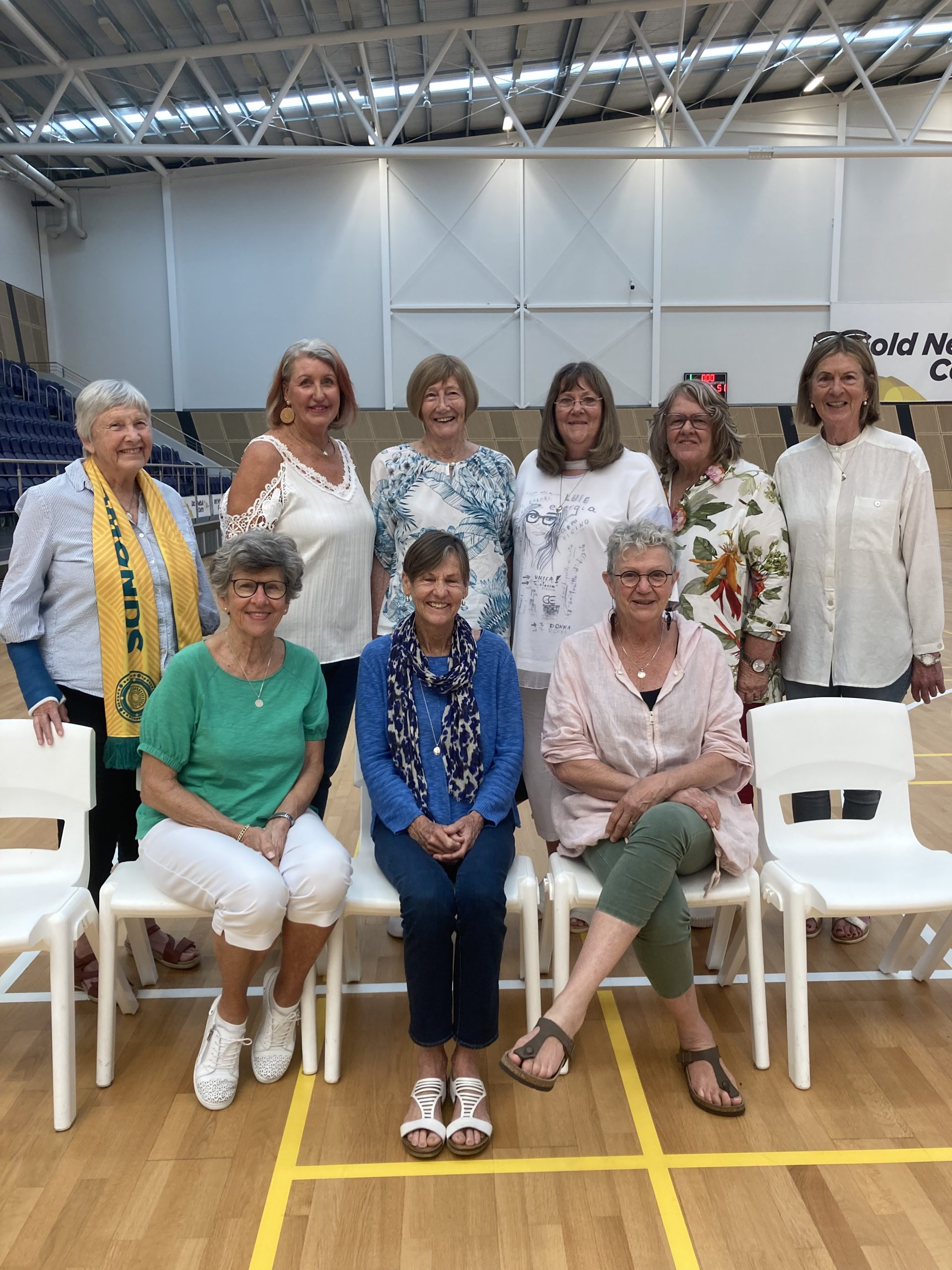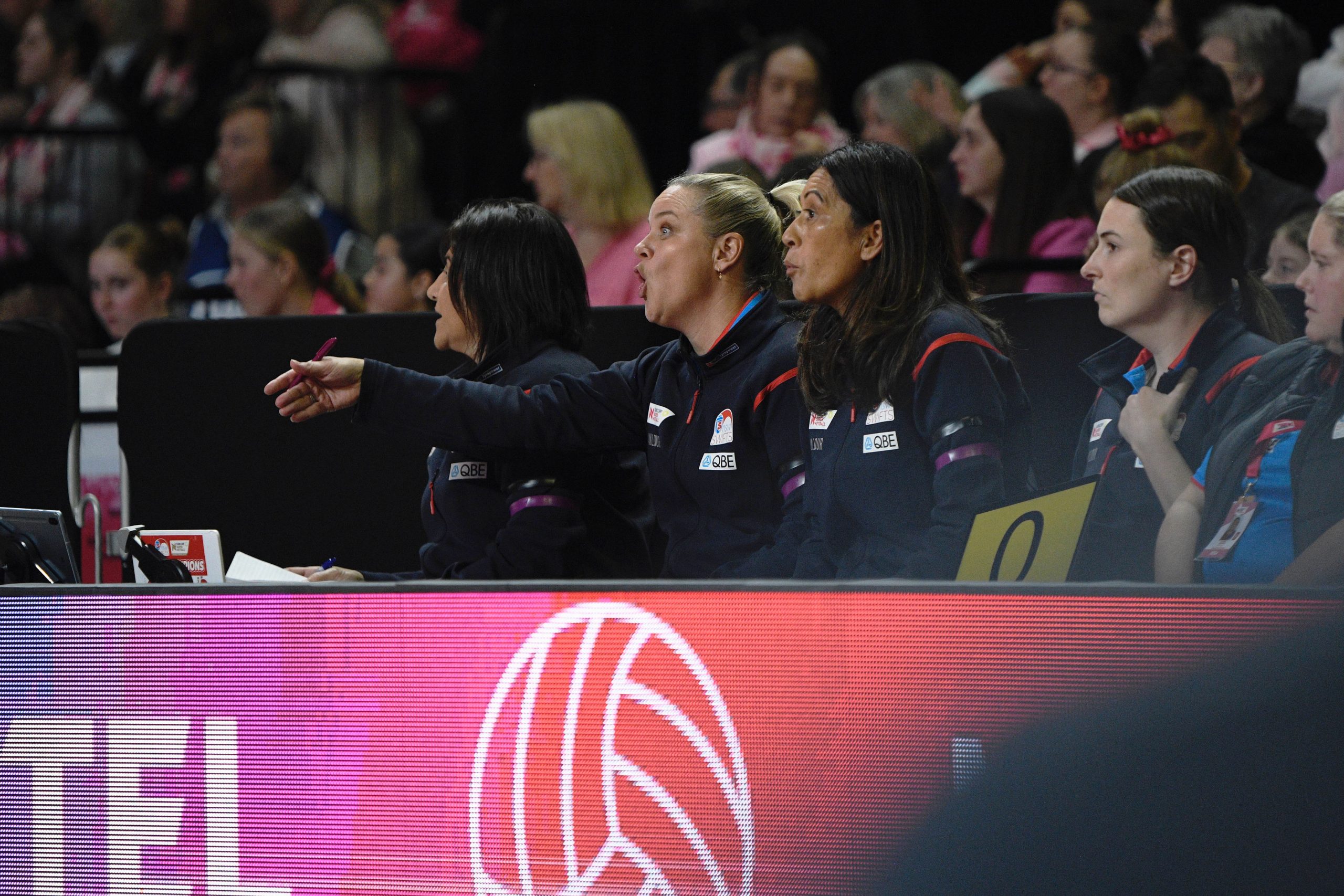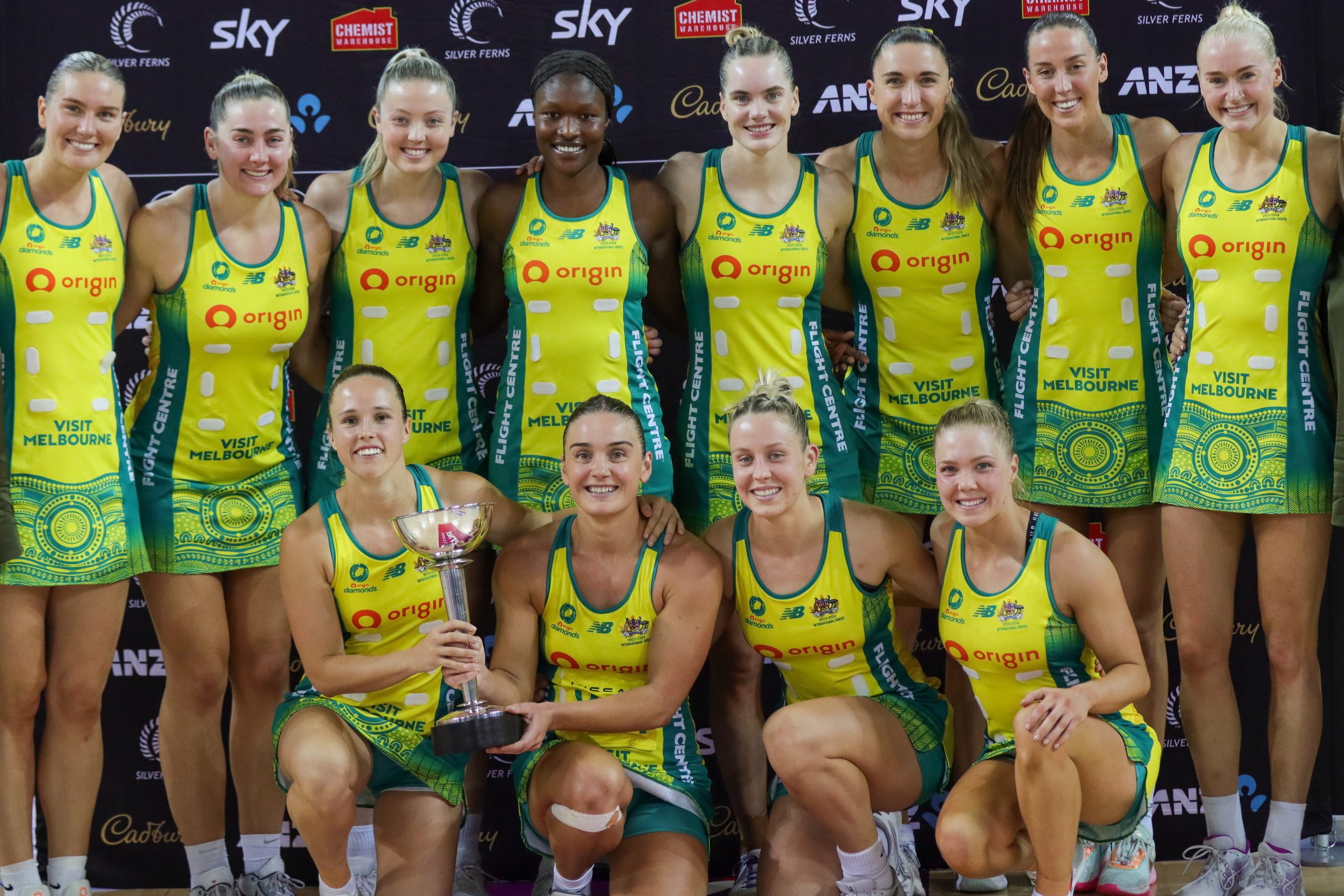There are many great sporting rivalries, but you would go a long way to find a bigger one than that between the Australian Diamonds and the New Zealand Silver Ferns. They first met 86 years ago, and the two countries have been challenging each other ever since, with that rivalry producing some of the most enthralling and exciting contests in all of sport. Netball Scoop looks at the history of netball between the Diamonds and Silver Ferns…
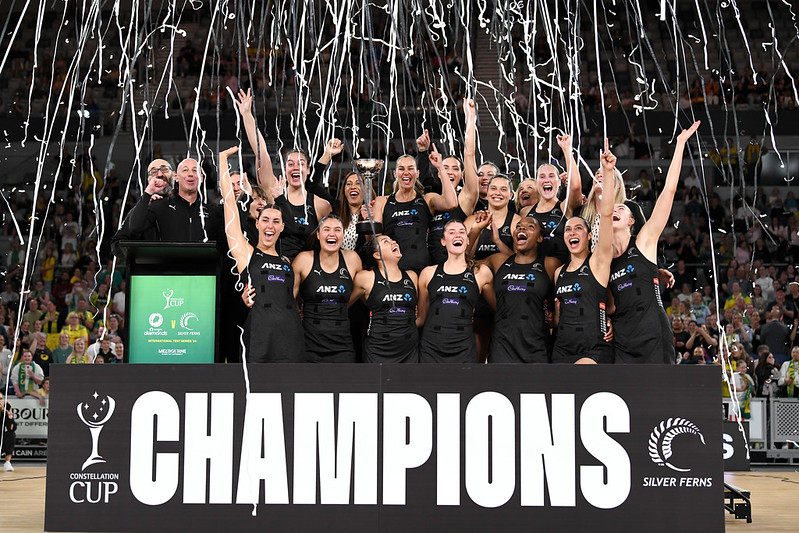
The Silver Ferns are Constellation Cup winners for 2024. Image: Aliesha Vicars.
Early Days
Trans-Tasman netball began in very humble circumstances on August 20, 1938 at Royal Park in Melbourne. A team from New Zealand was invited to take part in the Australian women’s basketball championships. An Australian team was selected from those championships, and they took on the kiwis in what would become known as the first test match between the two nations.
Australia won the match easily, by a score of 40-11, but that wasn’t a fair reflection of New Zealand’s performance as they had to overcome some real difficulties. Just one of the problems the Kiwis had to contend with in the early years, was playing seven-a-side when they were used to playing a nine-a-side version of the sport at home.
At the time, there were actually several differences in rules and interpretations between the countries. One of those was a bizarre (and dangerous) centre bounce that was used in Australia. Picture a toss-up, but instead of throwing the ball up, the umpire bounced the ball down and the centres had to try to grab it on the way back up! That was one of the rules that was changed when the two countries set about drawing up a standard set of rules for future clashes. The New Zealand option of a centre pass was adopted instead.
Despite the lopsided score, there was a lot of goodwill after that first test, and the two nations were scheduled to meet again the following year. Unfortunately, World War Two intervened. Australia’s first ever netball captain was Becky Bollen, and New Zealand’s first leader was Margaret Matengi. For both of them, that original match in 1938 would be their one and only test, as it wasn’t until 1948 that the two countries played again. Australia toured New Zealand and won 3-0. Surprisingly, it was then a further 12 years until the next series in Australia.
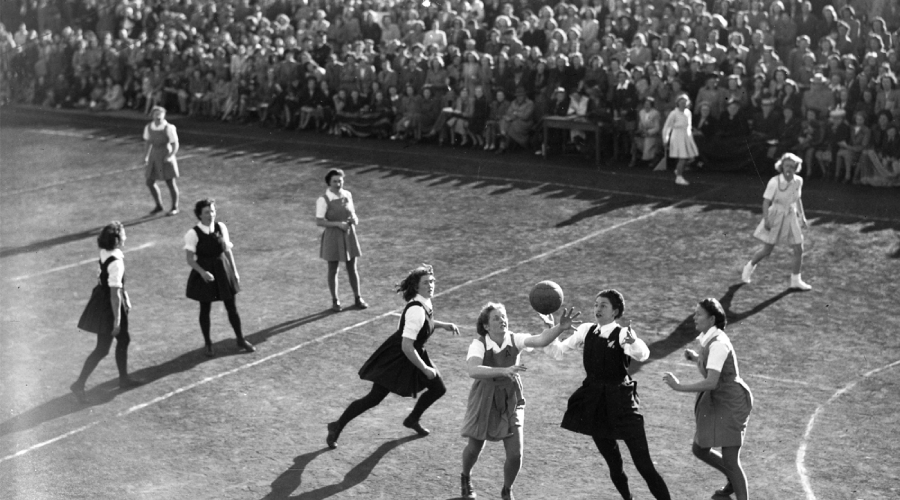
Action during the 1948 Australian tour of New Zealand. Image: Netball Australia
The 1960s
In Adelaide on August 20, 1960 (exactly 22 years after the first test), New Zealand had their first win over Australia, before the Australians went on to take out the series 2-1.
1960 was also the year that the International Federation of Women’s Basketball and Netball was formed. That’s the organisation now known as World Netball. A set of standardised rules for international matches was ratified, and the decision was made to hold a world championship of the sport every four years, with the first “World Tournament” to be held in Eastbourne in England in 1963. And so, the event we now know as the Netball World Cup was created.
On August 8, 1963, we saw the first match between Australia and New Zealand in a major tournament. And in a sign of things to come, there was very little between the two sides. The Australian team prevailed by just one goal (37-36) in the decisive match of the fortnight, and they claimed the first ever world netball title. Lorna McConchie, who had been a part of the first Australian team in 1938, was the winning coach, while Joyce Brown was the winning captain.
Brown holds a special place in world cup history, having been to one tournament as a player (1963) and three as coach (1975, 1983, 1991), winning the world title on each occasion, and never once tasting defeat in a match. She was part of 10 wins from 10 games as a player, and 29 wins and one draw from 30 matches as coach.
Another very notable player from 1963 was Lois Muir, vice-captain of New Zealand. After her playing days, Muir went on to coach the Kiwis in four straight world tournaments from 1975 to 1987, winning titles in 1979 and 1987. She has been involved in the game at various levels for decades and has a reputation unmatched in New Zealand netball.
It’s incredible to think that Brown and Muir, two women who would later come to be regarded as netball royalty in Australia and New Zealand, were both there in Eastbourne when major international netball took its first tentative steps.
1963 WORLD TOURNAMENT
1st – AUSTRALIA
BROWN, Joyce (captain)
CALDOW, Margaret
EATON, Valerie
FLEMING, Corrin
FOLEY, Annette
MCIVER, Jeanette
NOSEDA, June
RITCHIE, Wilma
TOUGH, Ingrid
WILSON, Madeleine
Coach: Lorna McConchie
2nd – NEW ZEALAND
BAKER, Leslie
BLAIR, Judy
EDMONDS, Pamela (captain)
FAULKNER, Rebecca
MARTIN, Joan
MCMASTER, Colleen
MCNAMARA, Betty
MUIR, Lois
SIMPSON, Elva
TE MOANANUI, Mirth
Coach: Dixie Cockerton
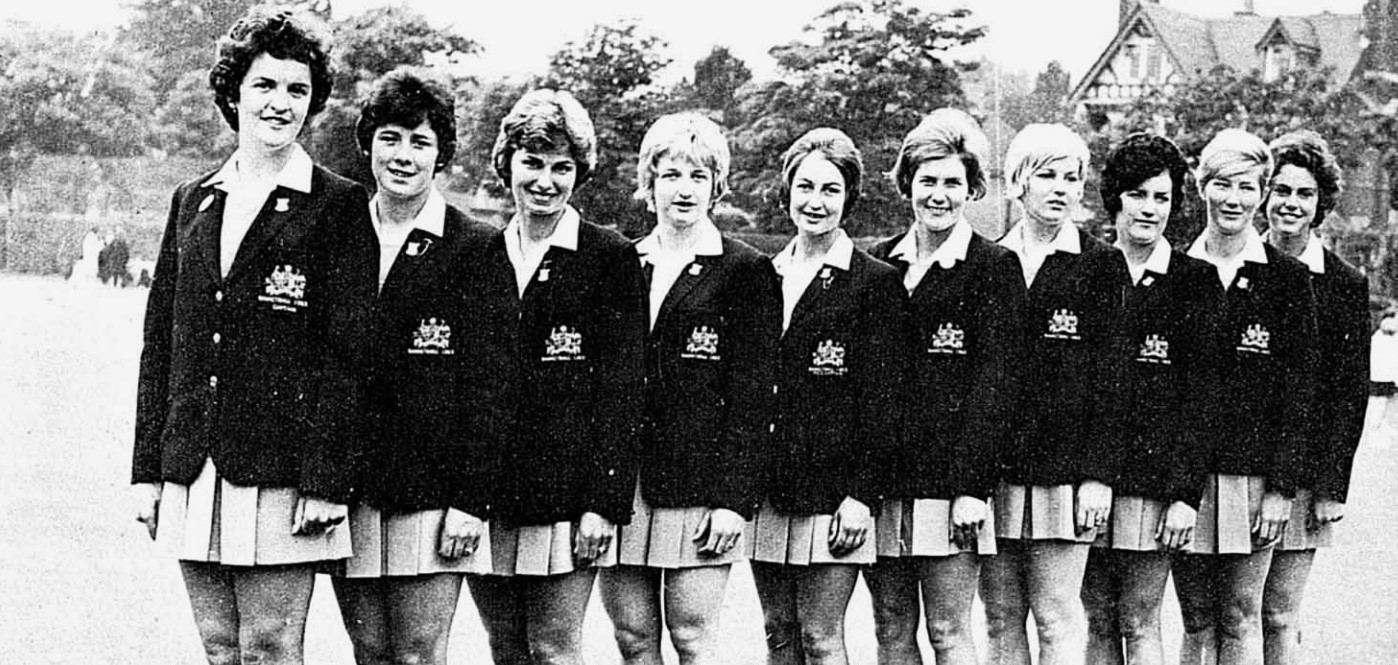
The winning Australian team in 1963, led by Joyce Brown. Image: Netball Australia
The 2nd World Tournament was held in Perth in 1967, and New Zealand claimed their first title. The Kiwis, captained by Judy Blair and well coached by another New Zealand netball legend, Taini Jamison, sealed victory with a strong 40-34 defeat of Australia on the final day, coming from behind to beat the home team.
This was a great all round New Zealand team, but the star of the show was goal attack Joan Harnett who was named player of the tournament. Her silky skills in the shooting circle were such that when Netball New Zealand celebrated its 75th anniversary in 1999, she was given the honour of being voted their best player to that point.
Harnett’s shooting partner, Mirth Solomon (Te Monanui) was another big part of the New Zealand team. She was playing not long after the birth of her first child, and despite that, she was the tournament’s top goal scorer. She also famously led the team in a victory Haka after their win. Blair, Harnett, and Solomon had all played together in the 1963 team, whereas the Australian team was completely different to that which played in Eastbourne.
1967 WORLD TOURNAMENT
1st – NEW ZEALAND
BLAIR, Judy (Captain)
BOELEE, Ann
GARDINER, Margaret
HAMILTON, Pamela
HARNETT, Joan
IRWIN, Billie
JAMES, Sandra
ROWLEY, Elizabeth
SOLOMON, Mirth
VERCOE, Tilly
Coach: Taini Jamison
2nd – AUSTRALIA
BURTON, Chris
DAVEY, Lynette (Captain)
GOLLAN, Stella
HARRIS, Elsma
KIRSANOVS, Maureen
MCLEAN, Heather
O’SHANNASSY, Ellen
SUITER, Glenyse
SWITCH, Gaye
WHITE, Carole Ann
Coach: Marg Pewtress
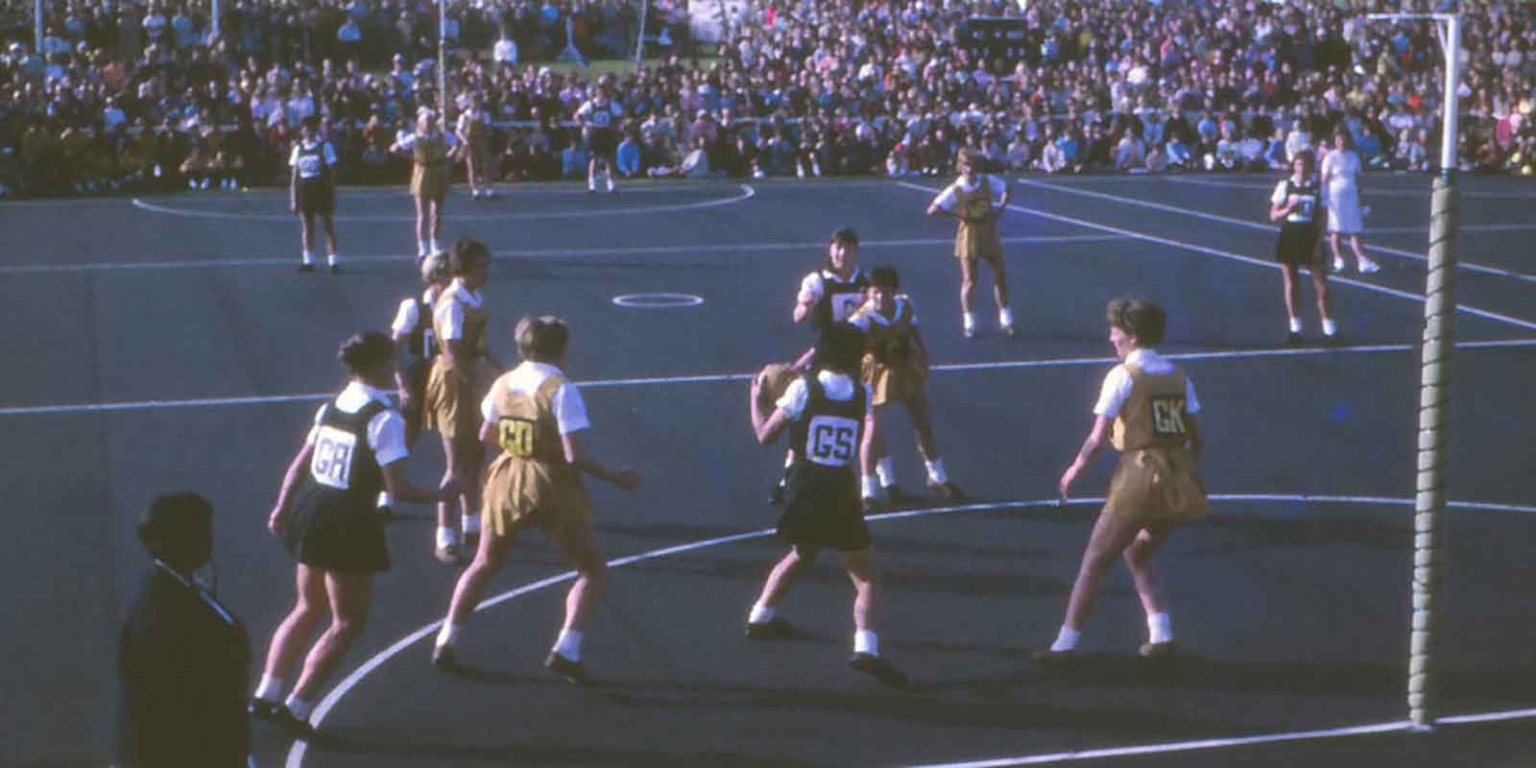
NZ beats Australia 40-34 to take out the 1967 World Tournament in Perth. Image: World Netball
The 1970s
In 1970, the name of the sport was finally officially changed from Women’s Basketball to Netball in both Australia and New Zealand. At the end of that year, the 3rd World Tournament began in Kingston, Jamaica, with the event finishing in early 1971. Joan Harnett was made captain of New Zealand in what was her final world cup. But it was Australia, led by midcourter Gaye Walsh (Teede), that went on to take out their second title with a 48-42 victory over the kiwis.
The Aussies were coached by Wilma Shakespear who had been a member of the winning team in 1963. The team contained the Gollan sisters who played at opposite ends of the court, goal shooter and goal keeper. Margaret Gollan (Molina) was the shooter and she would go on to be a successful Australian team manager in later years.
1971 WORLD TOURNAMENT
1st – AUSTRALIA
DELANEY, Terese
GOLLAN, Margaret
GOLLAN, Stella
MERILLO, Elsma
PYATT, Ricky
ROUTLEY, Noela
SIDEBOTTOM, Cheryl
SIMPER, Annette
WALKER, Anne
WALSH, Gaye (Captain)
Coach: Wilma Shakespear
2nd – NEW ZEALAND
HARNETT, Joan (Captain)
KING, Nancy
LANGROPE, Shirley
MAIR, Lorraine
MCKAY, Olwyn
NORMAN, Sandra
PALMER, Coral
VERCOE, Tilly
WALKER, Brenda
WEBSTER, Frances
Coach: Taini Jamison
The 4th World Tournament in Auckland in 1975 saw the introduction of another legend. Norma Plummer played centre for Australia in what was to be her only tournament as a player, before having double success as Australian coach over 30 years later (2007, 2011). Meanwhile, Yvonne Willering played the first of her three World Cups for New Zealand.
With New Zealand suffering a shock one-goal defeat to England, Australia needed only to draw with the hosts on the final day to claim the title. Incredibly, that’s exactly what happened. It was a classic trans-Tasman contest, full of twists and turns, including Plummer taking a dramatic fall on the hard asphalt court.
In the end, the two teams couldn’t be separated. 34-34 was the score, enough for Australia to take the title. If New Zealand had scored just one more goal, there would have been three joint winners – Australia, New Zealand and England.
1975 WORLD TOURNAMENT
1st – AUSTRALIA
BURTON, Chris
CALDOW, Margaret (Captain)
DORRINGTON, Gail
GOLLAN, Margaret
HAYES, Sharon
KRUYER, Maryanne
PLUMMER, Norma
REDMOND, Pam
STEVENSON, Cheryl
TAYLOR, Betty
Coach: Joyce Brown
3rd – NEW ZEALAND
BLOMQUIST, Maxine
CARNIE, Beth
GRANGER, Frances
GUNSON, Lyn
LANGROPE, Shirley (Captain)
MUNRO, Marilyn
PIETZNER, Christine
SALTER, Georgina
TAYLOR, Anne
WILLERING, Yvonne
Coach: Lois Muir
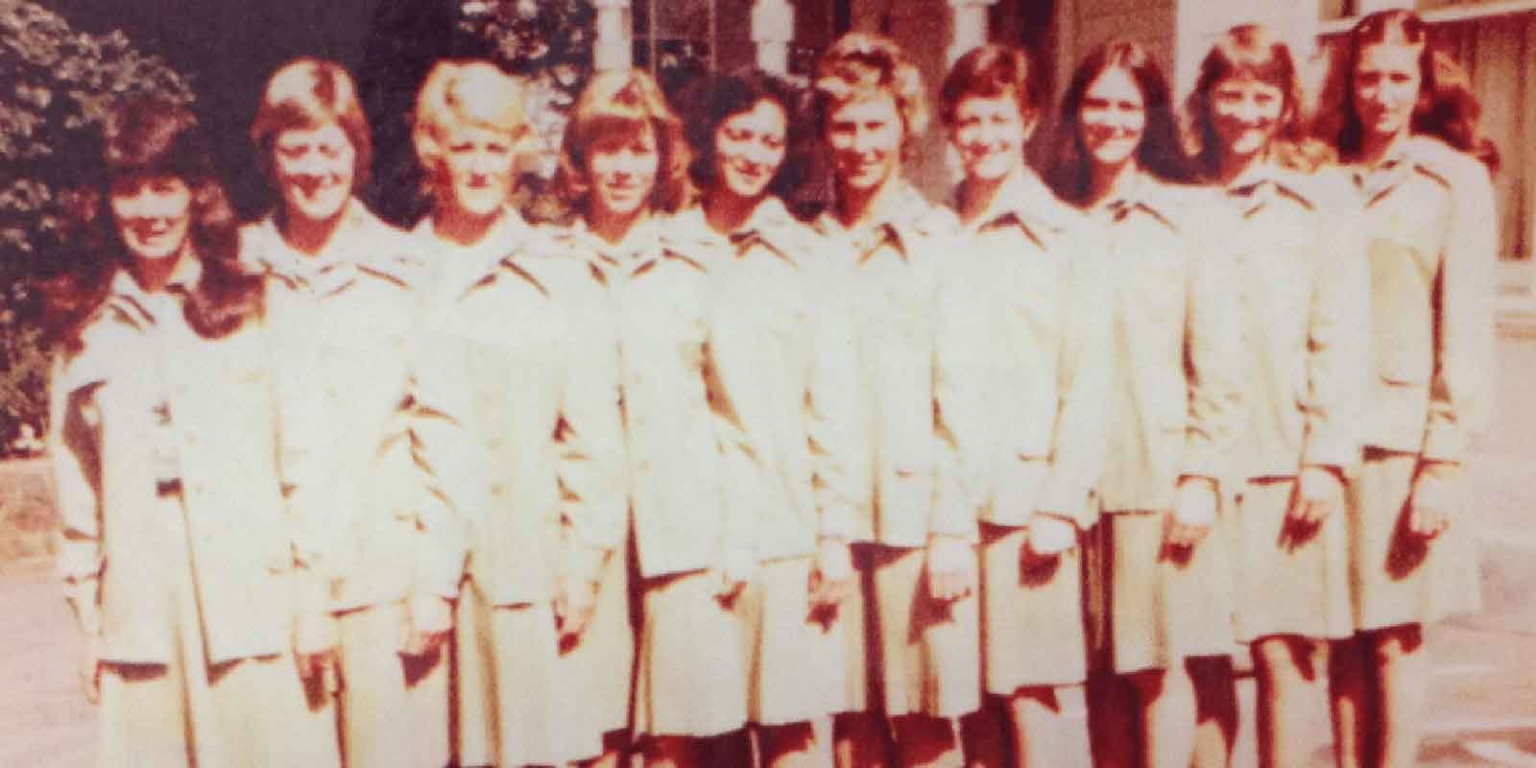
The 1975 Australian team, led by Marg Caldow and featuring Norma Plummer. Image: World Netball
In 1979, the 5th World Tournament was held in Port of Spain, in Trinidad & Tobago, and despite how close the competition came to a three-way tie in 1975, no change was made to the format. And so of course it happened. Australia, New Zealand and Trinidad and Tobago all finished with the same number of competition points, and with no provision in the rules for any way of separating teams, they were all declared joint winners. Australia defeated New Zealand 38-36 when they met during the tournament.
This was the last world cup for legendary Australian goal attack Marg Caldow, who captained the side in 1975 and 1979. She was a three time world cup winner as she was also a part of the 1963 side. While Caldow is credited with pioneering the high release shooting style that is used by most shooters today, it was first showcased by English shooter Judy Heath in the 1971 edition.
The captain of the New Zealand team, Lyn Gunson, was regarded as one of the finest midcourters in the world and she would go on to forge a coaching career, not only with New Zealand, but also in England. Ruth Fathers didn’t play a big part in the 1979 tournament, but later as Ruth Aitken, she would go on to have a very successful coaching career, guiding the Ferns to the 2003 World Championship as well as the 2006 and 2010 Commonwealth Games gold medals.
Interestingly, for the whole decade of the 1970s, Australia and New Zealand never met outside of the World Tournaments that were held. So the two countries played each other just three times during the entire decade. Imagine that happening now.
1979 WORLD TOURNAMENT
Eq 1st – AUSTRALIA
BURTON, Sharon
CALDOW, Margaret (Captain)
CARROLL, Betty
DORRINGTON, Gail
FRANCOU, Julie
KENNEDY, Terese
REDMOND, Pam
SARGEANT, Anne
TEEDE, Gaye
WATERS, Yvonne
Coach: Wilma Shakespear
Eq 1st – NEW ZEALAND
BLOMQUIST, Maxine
FATHERS, Ruth
FORSYTH, Margaret
GUNSON, Lyn (Captain)
HENDERSON, Janice
KAMANA, Margharet
KATAE, Geane
MILLS, Leigh
MUNRO, Marilyn
PIETZNER, Christine
PROUDLOVE, Lynn
WILLERING, Yvonne
Coach: Lois Muir
The 1980s
In the 1980s, regular tours began between the two nations. On occasions, a third country was invited and the three teams would play in a tri-series of shortened test matches (40 minutes), meaning they would each play two test matches on the same day! These series were usually very close and competitive.
The 6th World Tournament was held in Singapore in 1983, and after the events of 1979, there was a change to the competition format. Still no final though. Instead, there was a finals round featuring the top four teams. Australia defeated New Zealand 47-42 and remained unbeaten in nine matches over the whole fortnight to take the title in scorching hot conditions.
Australian shooter Anne Sargeant played a big role in a team well led by midcourter Julie Francou. Sargeant is a legend in netball circles and has gone on to be one of the biggest figures in the game in Australia. After a highly successful playing career, she has made a name for herself in the media and as an Australian selector.
1983 WORLD TOURNAMENT
1st – AUSTRALIA
CLEVELAND, Diane
FRANCOU, Julie (Captain)
HARRIS, Chris
HAWKINS, Sue
MCDONALD, Dianne
MCINTOSH, Jill
PARTINGTON, Kav
SARGEANT, Anne
SEARLE, Jane
SMITH, Karan
Coach: Joyce Brown
2nd – NEW ZEALAND
FATIALOFA, Rita
FEAR, Tracey
FORSYTH, Margaret
GIBBS, Leigh
MATENGA, Margaret
MEADS, Rhonda
PARKER, Lyn (captain)
PROUDLOVE, Lynn
TAUMAUNU, Waimarama
WILLERING, Yvonne
Coach: Lois Muir
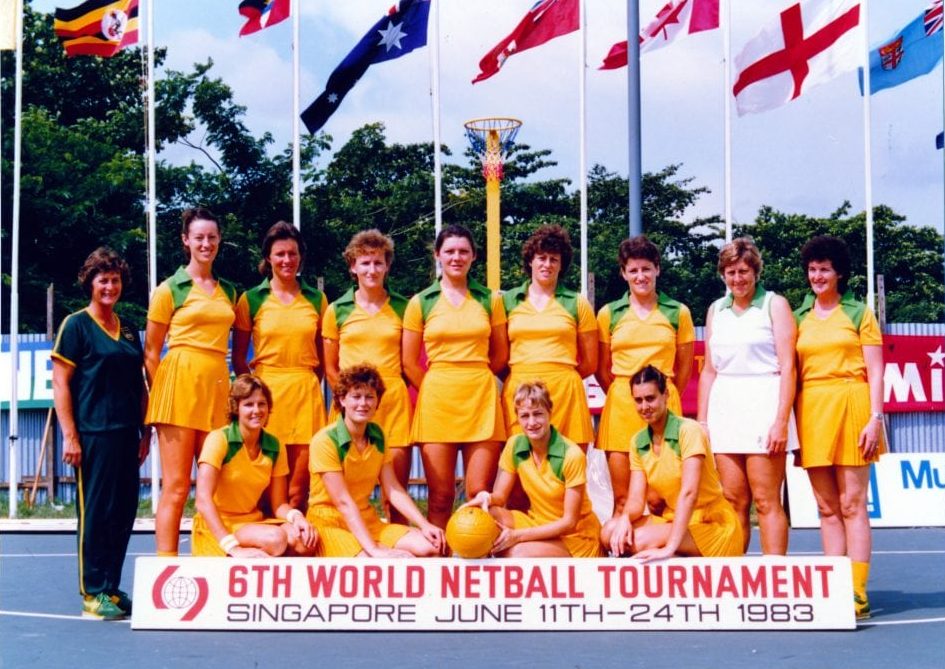
The Australians, led by Julie Francou, were champions in Singapore in 1983. Image: World Netball
The 7th World Tournament in Glasgow in 1987 was something of a nightmare for the Australian team. They were beset with injuries both before and during the event, including one to Australian captain, Anne Sargeant, who was playing in her last world cup. But even at full strength, it’s very doubtful they could have beaten what was a dominant New Zealand team.
No opposition got within 10 goals of the kiwis for the entire competition. In the finals round, they defeated Australia 39-28. The Australians finished equal second with Trinidad & Tobago. The New Zealand lineup, led by captain Leigh Gibbs and coached by Lois Muir, included some players who are regarded as amongst the best of all time for New Zealand.
They included Wai Taumaunu and Tracey Fear in defence, shooter Margaret Matenga, and midcourters Rita Fatialofa and Sandra Edge (or Sandra Mallett as she was known then). Edge gained a reputation as the best centre in world netball and her combination with Fatialofa was something special.
With this core base of exceptional players, New Zealand dominated trans-Tasman netball in the second half of the 1980s. That included success at the World Games, an event for sports not included at the Olympics. Netball was involved three times, and the strong kiwi team was able to capture the first two World Games titles in 1985 and 1989.
1987 WORLD TOURNAMENT
1st – NEW ZEALAND
EYRL, Tracy
FATIALOFA, Rita
FEAR, Tracey
FORSYTH, Margaret
GIBBS, Leigh (Captain)
HEFFERNAN, Annette
MALLET, Sandra
MATENGA, Margharet
PULE, Angela
SOLIA, Joan
TAUMAUNU, Waimarama
TOWNSEND, Julie
Coach: Lois Muir
Eq 2nd – AUSTRALIA
ATKINSON, Di
BEEHAG, Lisa
DEVERY, Keeley
ELLA, Marcia
HARRIS, Chris
IRONMONGER, Sally
JENCKE, Roselee
JONES, Michelle
KENNY, Sue
PETERSON, Janelle
SARGEANT, Anne (Captain)
WILSON, Vicki
Coach: Wilma Shakespear

The all-conquering New Zealand team took out the World Tournament in Glasgow in 1987. Image: World Netball
The 1990s
The decade began with netball being included as a demonstration sport at the 1990 Commonwealth Games in Auckland. The Australians triumphed over New Zealand, but the result was of less significance than the fact that it led to netball becoming a fully-fledged Commonwealth Games sport eight years later. 1990 was also the year that the New Zealand team officially became known as the “Silver Ferns”.
The following year, 1991, was a watershed moment for netball. This was the time when the whole perception of the sport seemingly changed for the better. The world titles went from being a quaint, amateur style event to something more professional and popular. The event was now called the World Championships and the eighth edition in Sydney was played indoors on a wooden floor. This was a big step up after 28 years of playing outside on asphalt in all sorts of weather.
And finally… we had a final. And what a final it was. A then world record crowd turned up to watch the 1991 World Championship decider between Australia and New Zealand. The game was also shown live on television, a first in Australia. The final was so gripping, it no doubt got many watchers hooked on netball. It was a match for the ages, with great battles all over the court including Carissa Dalwood v Sandra Edge at centre.
The Silver Ferns held a slight advantage for much of the game, and in fact led by one goal at every change. The last quarter was intense. Thanks to some nerveless shooting from Vicki Wilson, Australia grabbed the lead late in the game. New Zealand captain Wai Taumaunu, playing in her third and last world cup, then intercepted brilliantly and sent the ball toward the Kiwi shooting circle, only for defender Roselee Jencke to take an intercept of her own and seal the game for Australia 53-52.
It was an exciting climax to a ground-breaking tournament which raised the profile of netball in Australia, especially with Australia’s sports loving Prime Minister Bob Hawke in attendance. And it was another triumph for coach Joyce Brown who ended her world cup career undefeated.
1991 WORLD CHAMPIONSHIPS
1st – AUSTRALIA
DALWOOD, Carissa
DEVERY, Keeley
FIELKE, Michelle (Captain)
FINNAN, Sharon
JENCKE, Roselee
KENNETT, Jennifer
KENNY, Sue
MCKINNIS, Simone
O’DONNELL, Shelley
WAGG, Catriona
WILSON, Vicki
Coach: Joyce Brown
2nd – NEW ZEALAND
CARTER, Julie
COX, Tanya
DILLMORE, Robin
EDGE, Sandra
EYRL-SHORTLAND, Tracy
HODSON, Joan
LEAVER, Leonie
NOUVAO, Ana
TAUMAUNU, Waimarama (Captain)
TOPPING, Carron
WAITE, Sheryl
WALL, Louisa
Coach: Lyn Parker
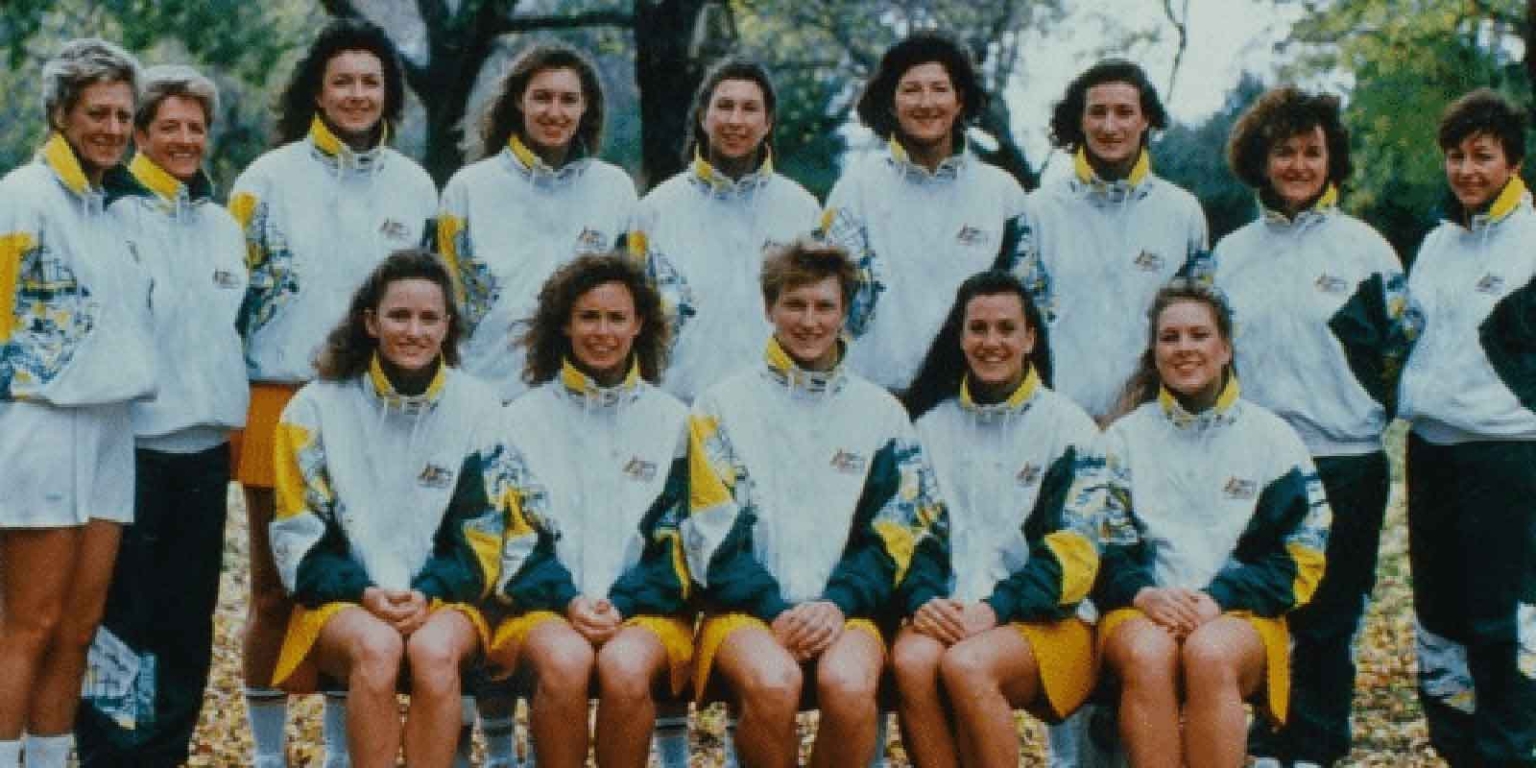
The victorious 1991 Australian team ahead of the Sydney World Championships. Image: Netball Australia
After the 1991 World Championships, Australia entered a period of domination against New Zealand, winning six straight games, some by large margins. That included victory in 1993 on the third and last occasion that netball was included at the World Games. In 1994, Sandra Edge who had taken a break from netball, returned to lead a more competitive Ferns as they finally ended that run of losses with a victory in the final test at Auckland.
In 1995, the 9th World Championships headed to Birmingham, and we witnessed a huge upset. Back from over two decades in the sporting wilderness, the South African team, including a young shooter by the name of Irene van Dyk, caused a boilover when they toppled New Zealand in their group game.
The stunning result had a huge impact on the tournament, as it meant Australia and New Zealand couldn’t meet in the final, and would instead meet far earlier than expected. As it turned out, it was yet another trans-Tasman classic. After a tense battle, Australia just got over the line 45-44. Sadly though, Vicki Wilson suffered a serious knee injury during the game and she missed the final, replaced at shooter by Jenny Borlase.
Australia comfortably defeated South Africa in the decider and one of the stars for Australia was a young Liz Ellis who had the first of numerous encounters with van Dyk in big games. Incredibly, this was the first time that a trophy was awarded to the winning team, and Aussie captain Michelle Fielke (den Dekker) was the first leader to have the honour of holding it up.
Retiring after this event, the outstanding goal defence finished her career with 84 test caps and she was captain in 71 of those (the most for an Australian captain), for an astonishing success rate of 92% (65 wins, 6 losses). New Zealand had to settle for third place in the tournament, and their legendary captain, Edge also bowed out of international netball.
1995 WORLD CHAMPIONSHIPS
1st – AUSTRALIA
AVELLINO, Natalie
BORLASE, Jennifer
CUSACK, Nicole
ELLIS, Liz
FIELKE, Michelle (Captain)
HARBY, Kathryn
MCKINNIS, Simone
MURPHY, Marianne
O’DONNELL, Shelley
SUTTER, Sarah
TOMBS, Carissa
WILSON, Vicki
Coach: Jill McIntosh
3rd – NEW ZEALAND
BLAIR, Belinda
DAWSON, Julie
EDGE, Sandra (Captain)
GOLD, Sharon
JERRAM, Carron
MATOE, Deborah
MENE, Bernice
NICOL, Lesley
ROWBERRY, Anna
SHORTLAND, Tracy
TARINGA, Elisa
TAURUA-BARNETT, Noeline
Coach: Leigh Gibbs
In 1997, Netball Australia set up its first national league, the Commonwealth Bank Trophy, and New Zealand did the same the following year with the Coca-Cola Cup, later to become the National Bank Cup. Both of these leagues proved to be a hit and helped solidify the two countries as the strongest netball nations.
Netball made its debut as a fully fledged medal sport at the Kuala Lumpur Commonwealth Games in 1998. A young shooter called Sharelle McMahon was just starting her international career while another legend in Simone McKinnis was finishing hers. McKinnis had forged a reputation as the best wing defence in the world and she bowed out with a gold medal in another thriller.
The star-studded Australian team that had been so successful in the 1990s, was led by Vicki Wilson. Goal attack Belinda Colling led a strong New Zealand team coached by Yvonne Willering and featuring Bernice Mene in defence. It was a topsy turvy final with first one team on top, then the other. At three quarter time, it was level and both teams had their chances in a chaotic final quarter. The Aussies hit the front with four minutes to go and they were able to hold on in the tense final moments to win 42-39 and claim the first netball gold medal.
1998 COMMONWEALTH GAMES
1st – AUSTRALIA
BORLASE, Jennifer
CUSACK, Nicole
ELLIS, Liz
HARBY, Kathryn
ILITCH, Janine
MCKINNIS, Simone
MCMAHON, Sharelle
O’DONNELL, Shelley
SANDERS, Rebecca
SUTTER, Sarah
TOMBS, Carissa
WILSON, Vicki (Captain)
Coach: Jill McIntosh
2nd – NEW ZEALAND
BLAIR, Belinda
COLLING, Belinda (Captain)
DAWSON, Julie
HARDCASTLE, Sonya
LOFFHAGEN, Donna
MENE, Bernice
NICOL, Lesley
ROWBERRY, Anna
STEED, Jo
SUAFOA, Lorna
TAURUA, Noeline
VAGANA, Linda
Coach: Yvonne Willering
In 1999, the 10th World Championships were held in Christchurch, and after the shock of Birmingham, normal service was resumed as New Zealand met Australia in the final. The decider was set to be the last game for two Australian champions, captain Vicki Wilson and Carissa Tombs (Dalwood). But the Kiwis dominated the first three quarters, and led 34-28.
Wilson (15/26) was having a nightmare game, and that’s when coach Jill McIntosh made the decision to bench her. Jennifer Borlase was her replacement. She entered the game for the last quarter, joining youngster Sharelle McMahon who had come on at goal attack during the third. The new combination worked well and it wasn’t long before the six goal margin had disappeared.
The match then developed into an intense goal for goal battle. With time running out, New Zealand goal shooter Donna Loffhagen, who had in fact been the most reliable shooter on court to that point, inexplicably missed a close range penalty shot that would have put the Kiwis in front.
The ball was rebounded by Liz Ellis who sent it down court. After a passage of passes, and a mad scramble for the ball on the floor, wing attack Shelley O’Donnell got the ball to McMahon, who sank the winning goal with not a second to spare. Final score: Australia 42 v New Zealand 41.
Cue incredible scenes of jubilation from Australian players and total devastation for the New Zealanders. They couldn’t believe it had happened again. The Silver Ferns lost to Australia three times in world cups during the decade, and the margin on each occasion was one solitary goal with all three games going down to the final seconds.
Results will show that Australia dominated the 1990s. In fact, the record for the decade was 20-3 in their favour over New Zealand. But every time the two teams met at a major tournament, New Zealand lifted immensely with barely a goal in it. How different things could have been.
1999 WORLD CHAMPIONSHIPS
1st – AUSTRALIA
BORLASE, Jennifer
DELANEY, Jacqui
ELLIS, Liz
FINNAN, Sharon
HARBY, Kathryn
ILITCH, Janine
MCMAHON, Sharelle
O’DONNELL, Shelley
SANDERS, Rebecca
SQUIRE, Peta
TOMBS, Carissa
WILSON, Vicki (Captain)
Coach: Jill McIntosh
2nd – NEW ZEALAND
CHARTERIS, Belinda
COLLING, Belinda (Captain)
HARDCASTLE, Sonya
HARPER, Adine
LOFFHAGEN, Donna
MENE, Bernice
NICOL, Lesley
ROWBERRY, Anna
SEYMOUR, Julie
SUAFOA, Lorna
TAIRI, Teresa
VAGANA, Linda
Coach: Yvonne Willering
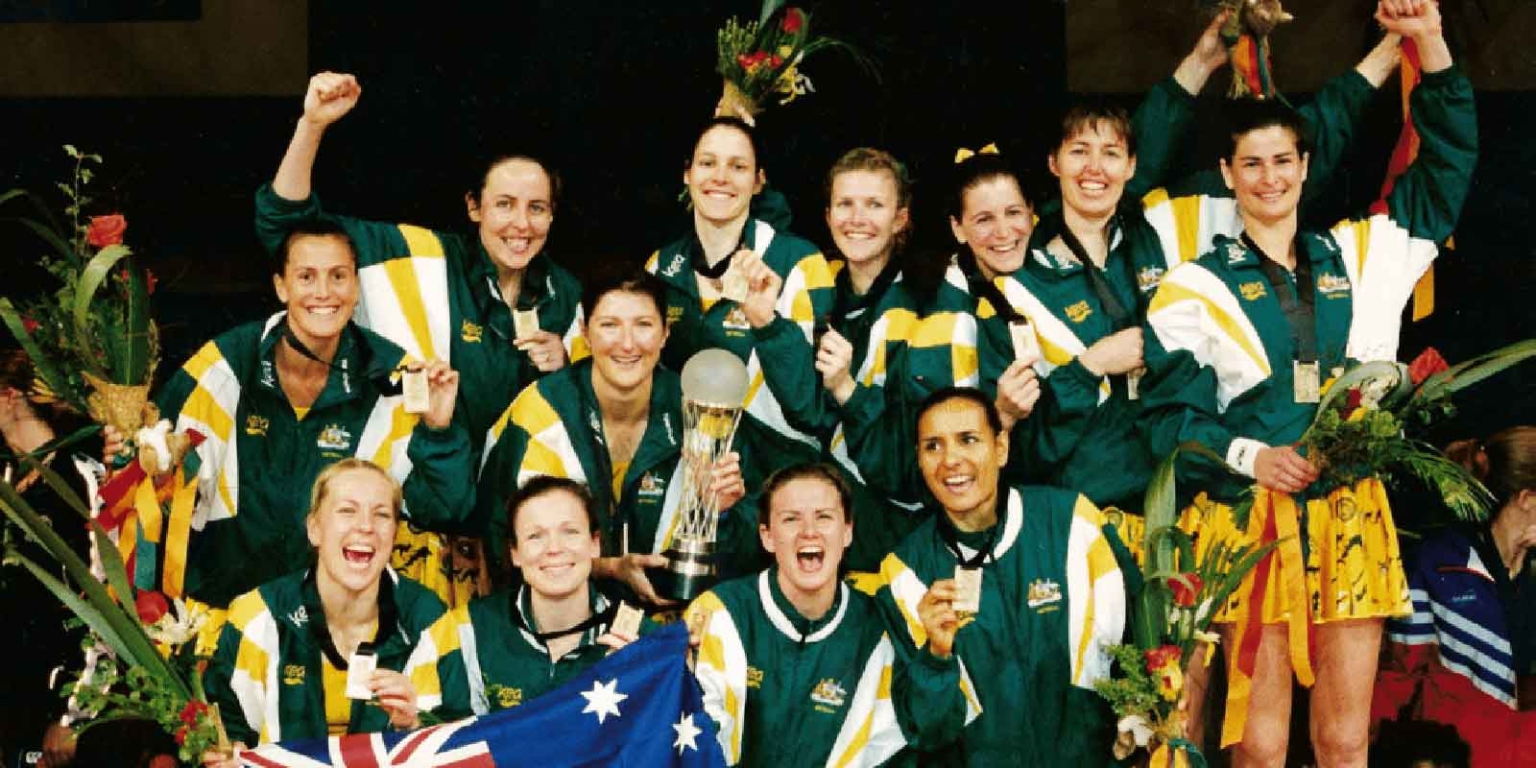
Vicki Wilson and the Australians take the trophy after an incredible finish in Christchurch in 1999. Image: World Netball
The 2000s
The year 2000 was a momentous one as South African captain Irene van Dyk switched allegiances. Having been to New Zealand for the World Championships, van Dyk then played as an import in the Coca-Cola Cup, and she loved her time so much, she decided to stay. With eligibility laws lax at the time, van Dyk was able to represent the Ferns straight away, which certainly didn’t sit well with some.
In the coming years, she would be joined by three defenders. Another former Protea, Leana du Plooy (De Bruin), a former Fijian representative, Vilimaina Davu, and Sheryl Clarke (Scanlan) who switched from Samoa to the Ferns. All of these players would feature heavily in the New Zealand team in years to come.
Late in 2001, Yvonne Willering was surprisingly sacked as Ferns coach and Netball New Zealand decided on a new direction with the appointment of Ruth Aitken.
In 2002, Australia won a dramatic Commonwealth Games gold medal final in Birmingham after sudden death extra time. This game was another classic, with thrilling moments throughout and both sides lifting to put on a terrific display in front of a big crowd.
The score was 46-46 at the end of regulation time, so the game went into extra time, but still these two great teams couldn’t be separated. It was 54-54 as time ran out in extra time. But for some reason, the game carried on. There was total confusion amongst commentators and all those watching. Why was the game continuing on after time was seemingly up?
What they didn’t realise then was that with the score still level after extra time, the game would just continue on and go into sudden-death extra time until one team led by two goals. There was total bewilderment with most people in the stadium having absolutely no idea what was going on. Luckily the players were eventually alerted to the state of play.
With Australia up by one, a Liz Ellis intercept gave the Aussies their chance. The ball moved down court and ended with Sharelle McMahon in the circle. She was contacted by Davu and awarded a penalty. But then to add to the tension, sweat had to be wiped from the floor. McMahon waited patiently, then when play resumed, she calmly sank the goal to give Australia an extraordinary 57-55 victory.
McMahon had done it again, just as she had in 1999. She was actually quite fortunate to even take part in the game, having rolled her ankle just two days before the final, but pain-killing injections did the trick. A replacement at half time, goal shooter Cath Cox played a big part for Australia, while Ellis and captain Kath Harby-Williams worked well in defence.
After the heartbreak of 1999, this was another dagger to the heart of Kiwi players and fans. The New Zealand team put in a great performance with players like Davu, van Dyk and Donna Loffhagen giving their all once again, only to lose in dramatic circumstances.
2002 COMMONWEALTH GAMES
1st – AUSTRALIA
BROADBENT, Alison
COX, Catherine
DELANEY, Jacqui
ELLIS, Liz
HARBY-WILLIAMS, Kath (captain)
HODGE, Alex
ILITCH, Janine
MCMAHON, Sharelle
RICHARDSON, Nicole
SANDERS, Rebecca
SQUIRE, Peta
SOUTHBY, Eloise
Coach: Jill McIntosh
2nd – NEW ZEALAND
CLARKE, Sheryl
COFFIN, Jenny-May
COLLING, Belinda
DAVU, Vilimaina
LOFFHAGEN, Donna
NICOL, Lesley
ROWBERRY, Anna
SEYMOUR, Julie (captain)
VAGANA, Linda
VAN DYK, Irene
VERONESE, Anna
WIPIITI, Daneka
Coach: Ruth Aitken
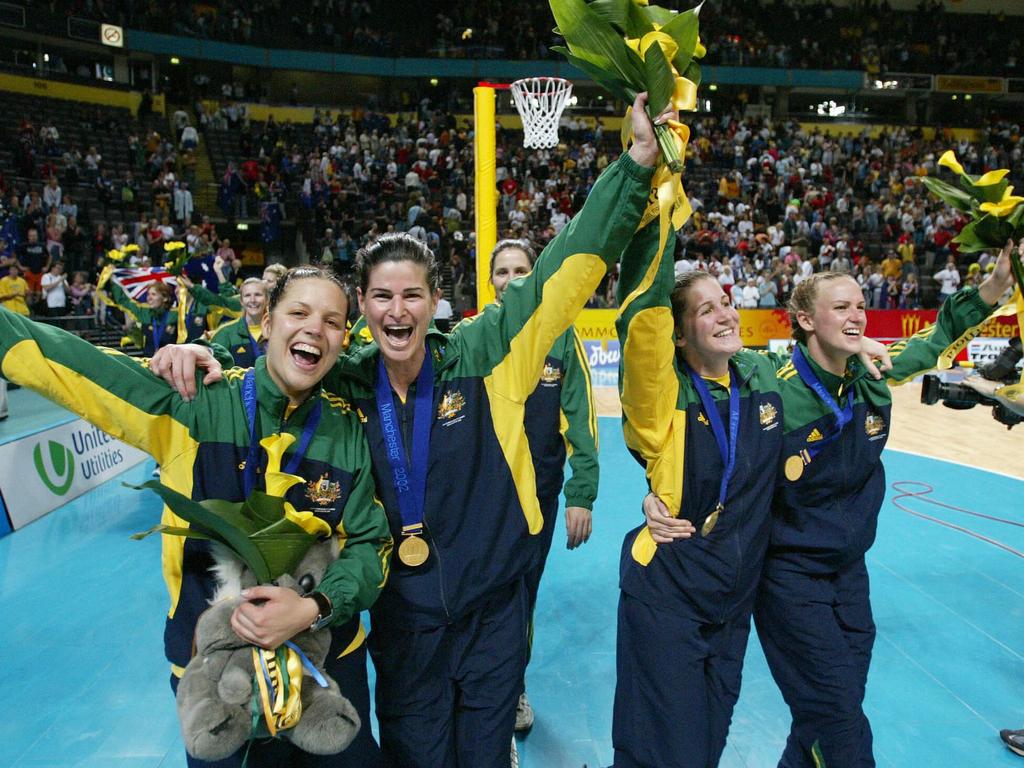
The Australians celebrate Commonwealth Games gold in Manchester in 2002. Image: Leon Mead
Come 2003 and the 11th World Championships in Kingston, there was almost a feeling of desperation among New Zealand fans. Surely this had to be the year that they finally added to their three world titles. During the tournament, Jamaica and England were both competitive, but it was no surprise to anyone when Australia and New Zealand found their way to the decider again.
The Silver Ferns, captained by wing attack Anna Rowberry and coached by Ruth Aitken, held the upper hand for much of the exciting contest, leading at every break. Despite the best efforts of Liz Ellis, van Dyk dominated the shooting circle, well fed by goal attack Belinda Colling. Between the pair, they shot at 92% compared to the Australians’ 78%.
Centre Temepara Clark was one of the stars of the game. She was in everything. Literally. In fact, she was dramatically sent from the court for a short time in the last quarter, which allowed Australia to equalise. But thanks to some great defence, the Silver Ferns were able to regain the lead and hold on to claim a deserved win 49-47 in front of a very loud pro-New Zealand crowd.
It was delight at last for the kiwis who had missed out narrowly to the Australians on so many occasions. This was a strong team full of players at the peak of their powers. Lesley Nicol was as solid as rock at wing defence and she combined superbly with Clark and Rowberry to complete a formidable midcourt.
As had happened four years earlier, the Australian captain, in this case Kath Harby-Williams, spent the last quarter of her career on the bench. Meanwhile, Jill McIntosh ended her Australian coaching career with the incredible record of two world cup wins, two commonwealth games titles, and 88 wins from 94 tests (94%).
2003 WORLD CHAMPIONSHIPS
1st – NEW ZEALAND
CLARK, Temepara
CLARKE, Sheryl
COLLING, Belinda
DALTON, Tania
DAVU, Vilimaina
DU PLOOY, Leana
HARPER, Adine
NICOL, Lesley
ROWBERRY, Anna (captain)
SCARLETT, Anna
TE HUNA, Jodi
VAN DYK, Irene
Coach: Ruth Aitken
2nd – AUSTRALIA
BROADBENT, Alison
CHOKLJAT, Natasha
COX, Catherine
ELLIS, Liz
HARBY-WILLIAMS, Kath (captain)
ILITCH, Janine
MCMAHON, Sharelle
NEELE, Cynna
RICHARDSON, Nicole
SANDERS, Rebecca
SCHOLZ, Peta
SOUTHBY, Eloise
Coach: Jill McIntosh
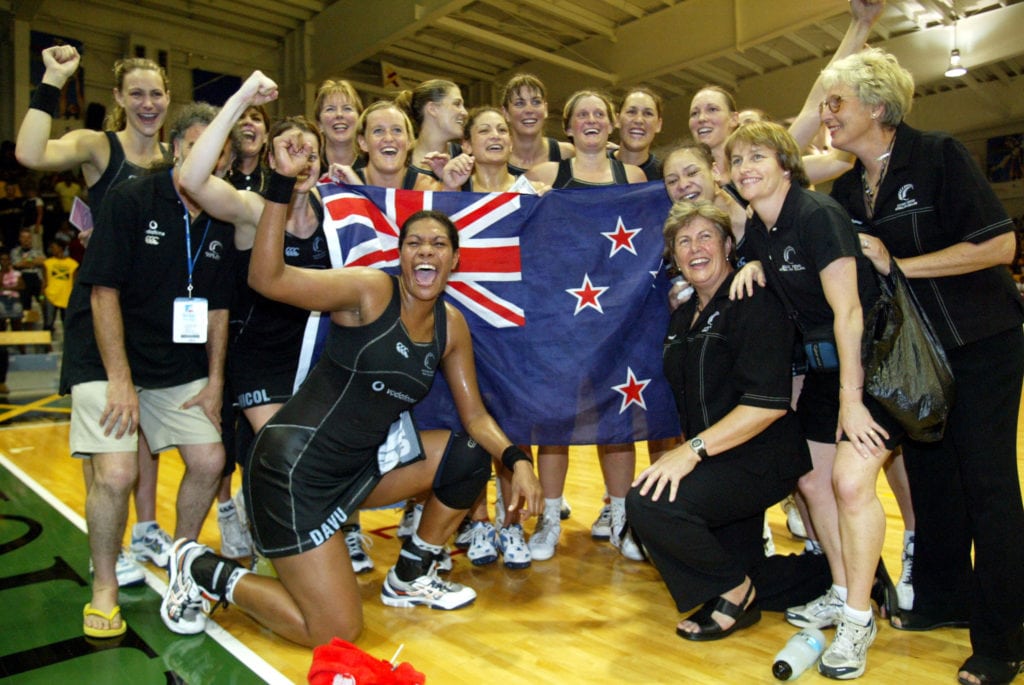
The Silver Ferns claimed the 2003 World Championship with victory in Kingston. Image: World Netball
In 2004, Norma Plummer took over as Australian coach and her stint started shakily, with a period of some domination for New Zealand. In 2004 and 2005, the Silver Ferns won six of the eight tests played between the countries. New Zealand’s captain Anna Rowberry unfortunately took little part however after suffering a serious knee injury. She was replaced as captain for a short time by Lesley Nicol, before Adine Wilson took over as full time leader.
Included in that run of New Zealand wins was a 25-goal drubbing in 2005 on a horror night for the Australians where their captain, Liz Ellis, also ruptured her ACL. Without Ellis, it was always going to be an uphill battle for Australia to win Commonwealth Games gold in Melbourne in 2006.
And so it proved to be with the final score being 60-55 in New Zealand’s favour. To their credit, the Aussies, led by Sharelle McMahon gave it absolutely everything but the kiwis were just too classy. Well led by Wilson, the whole team performed exceptionally, but without her great rival Ellis to battle, it was Irene van Dyk who proved unstoppable at goal shooter. Her combination with Belinda Colling was on song at this point.
New Zealand had now won two major tournaments in a row and were on top of the world. It was going to take a big effort to dethrone them. Being number two was an unfamiliar position for Australia’s netballers and it didn’t sit well with them. Later in 2006, Ellis returned from injury to help the Australians turn things around.
2006 COMMONWEALTH GAMES
1st – NEW ZEALAND
COLLING, Belinda
DAVU, Vilimaina
DE BRUIN, Leana
GEORGE, Temepara
LANGMAN, Laura
ROWBERRY, Anna
SCARLETT, Anna
TUKI, Jessica
TUTAIA, Maria
VAN DYK, Irene
WILLIAMS, Casey
WILSON, Adine (captain)
Coach: Ruth Aitken
2nd – AUSTRALIA
ANDERSON-DEHN, Megan
AVELLINO, Natalie
BROADBENT, Alison
CHATFIELD, Bianca
COX, Catherine
FUHRMANN, Susan
GILSENAN, Selina
ILITCH, Janine
MCMAHON, Sharelle (captain)
PRATLEY, Susan
SHYNN, Jessica
VON BERTOUCH, Natalie
Coach: Norma Plummer
Improved showings gave the Australian team added confidence as they headed to the 12th World Championships in Auckland. New Zealand had taken up the slack to host the tournament after it was taken away from original hosts Fiji due to political turmoil. And Auckland did a great job at short notice. The final was a strange game. Australia was seemingly in control for most of the match, but misfiring shooters kept the Kiwis in the hunt.
Australia led New Zealand 27-20 at half time, with sisters Nat and Laura von Bertouch in hot form in the midcourt. The Australian shooting circle was a bit chaotic in the second half, up against a strong New Zealand defence led by Casey Williams. They scored just eight goals in the third quarter as the Silver Ferns narrowed the gap to three. Then came an extraordinary last quarter.
Australia managed just seven goals in 15 minutes, but somehow that was enough as New Zealand only scored six. In what would turn out to be her last match, champion goal keeper Liz Ellis turned in a superhuman effort. Ellis combined with fellow defender Mo’onia Gerrard to continually deny Irene van Dyk and the Silver Ferns’ attack.
The final score was 42-38 and Ellis bowed out a winner with an amazing tally of 3 world and 2 commonwealth titles to her name. It was also a great victory for Norma Plummer who had guided the Australian team through one of the toughest patches in its history and now had them back on top.
2007 WORLD CHAMPIONSHIPS
1st – AUSTRALIA
CHATFIELD, Bianca
COX, Catherine
ELLIS, Liz (Captain)
GERRARD, Mo’onia
GILSENAN, Selina
McMAHON, Sharelle
MEDHURST, Natalie
NOURSE, Lauren
PRATLEY, Susan
PRENDERGAST, Julie
VON BERTOUCH, Laura
VON BERTOUCH, Natalie
Coach: Norma Plummer
2nd – NEW ZEALAND
BOWDEN, Maree
DE BRUIN, Leana
GRIFFIN, Paula
HENRY, Joline
LANGMAN, Laura
SCANLAN, Sheryl
SEYMOUR, Julie
TE HUNA, Jodi
TUTAIA, Maria
VAN DYK, Irene
WILLIAMS, Casey
WILSON, Adine (Captain)
Coach: Ruth Aitken
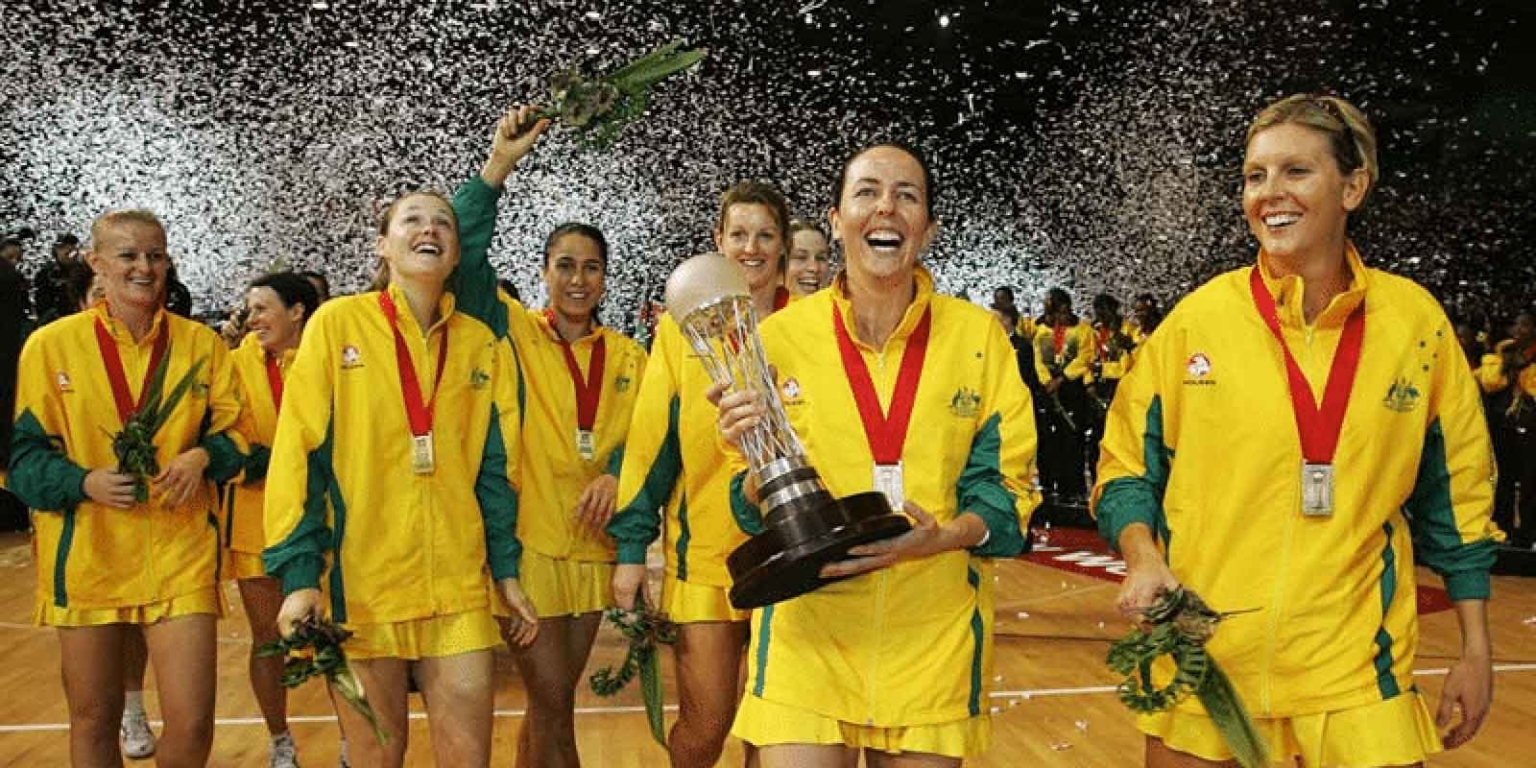
Liz Ellis bows out in style with the World Championship trophy in Auckland in 2007. Image: World Netball
In 2008, the Australian netball team was officially named the “Diamonds”. It was also the year that Netball Australia and Netball New Zealand got together to create the ANZ Championship, a club competition featuring five teams from each country. The competition would run for nine seasons, and produced many great highlights. However, it was dominated by Australian clubs, with Waikato Bay of Plenty Magic being the only New Zealand team to taste success in 2012.
The 2010s
While the Diamonds and Silver Ferns met regularly in the 2000s, it was all a bit random and haphazard, and there was a feeling that something more tangible and distinct was needed to represent trans-Tasman netball. So in 2010, the Constellation Cup was born; an annual series of tests between Australia and New Zealand.
It was at this time that competition between Australia and New Zealand on the netball court was perhaps as close as it has ever been. For a period of 11 matches over two years between 2009 and 2011, the two countries alternated wins, with neither country able to get two victories in a row over the other. Included in that run of 11 matches were two astonishing major tournament finals.
The Commonwealth Games final in Delhi on Thursday, October 14, 2010 is the longest netball match ever played. And also the greatest. This was truly an epic contest between the sport’s two greatest rivals. After starting slowly, New Zealand gradually began to get on top as the match wore on. So much so, that they were up by seven goals early in the fourth quarter and things looked grim for Australia.
Enter Cath Cox, and she very quickly turned things around. At 47-47 and with just a minute left in normal time, legendary kiwi shooter Irene van Dyk inexplicably panicked, went for a shot well outside her normal distance range, and missed. Luckily for her, Cox also missed just moments later at the other end with what would have been the gold medal-winning shot. After four quarters, the sides were dead level.
As the match went into extra time, New Zealand goal attack Maria Tutaia started getting cramps in her calves. Despite that (or maybe because of it), she then completely took over the Ferns’ shooting end. van Dyk was almost consigned to the role of spectator as Tutaia continued to put up shot after shot.
With extra time running out though, it was Australia that had the edge. They looked in control, one goal up and with the next centre pass, before a sneaky nudge from kiwi captain Casey Williams saw her Australian counterpart Sharelle McMahon penalised for breaking. The kiwis duly equalised and that meant we were going to sudden death.
A margin of two goals was now required for victory, and early on Cox found herself with another chance to win it for Australia. Unfortunately, her shot once again rimmed out, and so the game went on. And on. And on. It appeared as if it would never end. Time after time, Tutaia would sink critical long-range shots under pressure, only to see Cox do exactly the same in response.
It was an engrossing and captivating contest, the likes of which we’d never seen before, and it ticked over into its 84th minute, before finally being resolved in a rather bizarre manner. With Australia in possession and looking to equalise yet again, wing attack Kim Green suddenly slipped over, throwing the attack end into confusion. McMahon wasn’t able to find another teammate quickly enough and was called for held ball.
This was now New Zealand’s big chance. They steadily worked the ball down court, eventually finding Tutaia in the circle, and she calmly turned and took the shot from two-thirds distance. Just as with most of her other shots in this game, it never looked like missing. Final score: New Zealand 66 Australia 64. The kiwis were absolutely ecstatic; the Australians were just gutted.
Neither team deserved to lose but someone had to. On this occasion, it was the New Zealanders celebrating deliriously. So often, these two nations have produced something special, but this match took it to a whole new level. There were great performances from players on both sides, but the hero was undoubtedly Tutaia. Up until this match she had been somewhat derided as inconsistent and poor under pressure. On this day she stood up under the greatest pressure imaginable.
2010 COMMONWEALTH GAMES
1st – NEW ZEALAND
BARRETT-CHASE, Liana
DE BRUIN, Leana
GEORGE, Temepara
GRANT, Katrina
HENRY, Joline
LANGMAN, Laura
RASMUSSEN, Grace
SCARLETT, Anna
TUTAIA, Maria
VAN DYK, Irene
WILLIAMS, Casey (Captain)
WIPIITI, Daneka
Coach: Ruth Aitken
2nd – AUSTRALIA
BULLEY, Rebecca
COX, Catherine
FUHRMANN, Susan
GEITZ, Laura
GERRARD, Mo’onia
GREEN, Kimberlee
HALLINAN, Renae
MCMAHON, Sharelle (Captain)
MEDHURST, Natalie
NOURSE, Lauren
PRATLEY, Susan
VON BERTOUCH, Natalie
Coach: Norma Plummer
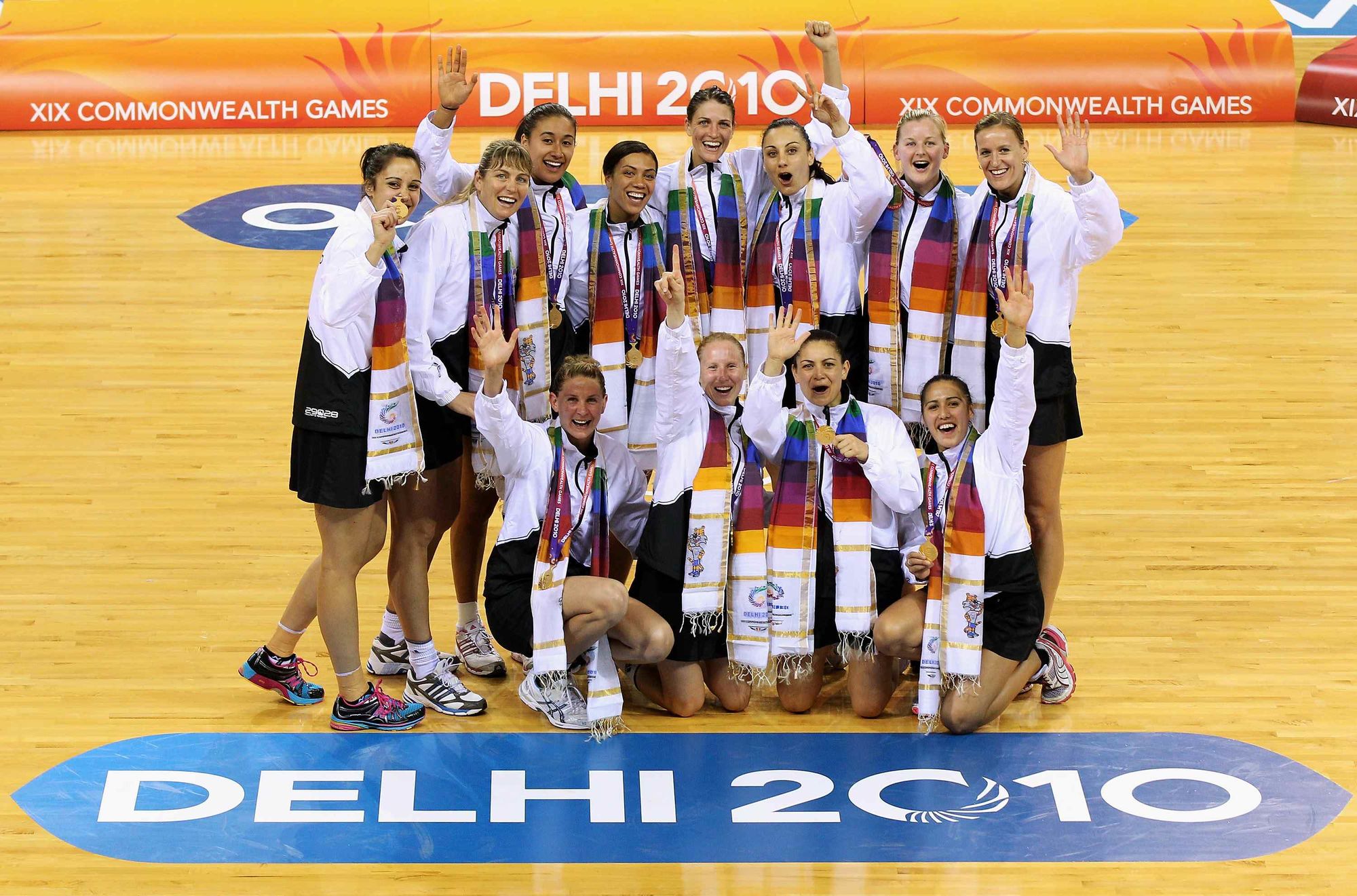
New Zealand claimed gold in Delhi in 2010 after an epic 84-minute final. Image: Netball New Zealand
For the 13th World Championships in 2011, netball headed back to Singapore for a second time and it was another memorable tournament. The final was another trans-Tasman classic. Australia had lost their captain Sharelle McMahon to injury earlier in the year. Centre Nat von Bertouch took over the captaincy, and she had another great duel here with Kiwi rival Laura Langman.
New Zealand started strongly and led 26-20 at half time. Irene van Dyk was on top, and at the other end, the Australians were struggling in attack. This led Norma Plummer to make changes to the Diamonds, bringing goal shooter Caitlin Bassett and goal keeper Laura Geitz into the game. The changes produced immediate results with the margin reduced to just one at three-quarter time.
With time running out in the fourth quarter, the Ferns looked headed for victory. They were up by one and had possession. But a steal by player of the match Nat Medhurst saw Australia draw level. And so we were off to extra time. Less than a year after the unbelievable Commonwealth Games final in Delhi, here we were again. At this stage, it seemed almost impossible to separate these two teams.
In extra time, the play ebbed and flowed until it came to Maria Tutaia who had the chance to shoot the winning goal, just as she had in 2010. But this time her shot rimmed out. Geitz was there to pick up the scraps and send the ball down court. The ball found its way to Bassett at the other end, who calmly shot the winning goal in the final seconds, prompting another huge celebration from the Diamonds.
It was another amazing finish, and the two players that Plummer had brought on at half time, had played a big hand. Although she didn’t know it at the time, this would be the legendary shooter van Dyk’s last major tournament. It was her fifth world cup, having played in two with South Africa and three with New Zealand.
2011 WORLD CHAMPIONSHIPS
1st – AUSTRALIA
BASSETT, Caitlin
BELL, Erin
CORLETTO, Julie
COX, Catherine
FUHRMANN, Susan
GEITZ, Laura
GERRARD, Mo’onia
GREEN, Kimberlee
LAYTON, Sharni
MEDHURST, Natalie
PITMAN, Chelsea
VON BERTOUCH, Natalie (Captain)
Coach: Norma Plummer
2nd – NEW ZEALAND
DE BRUIN, Leana
GEORGE, Temepara
GRANT, Katrina
GRIFFIN, Paula
HENRY, Joline
LANGMAN, Laura
LEOTA, Liana
SCARLETT, Anna
THOMPSON, Anna
TUTAIA, Maria
VAN DYK, Irene
WILLIAMS, Casey (Captain)
Coach: Ruth Aitken
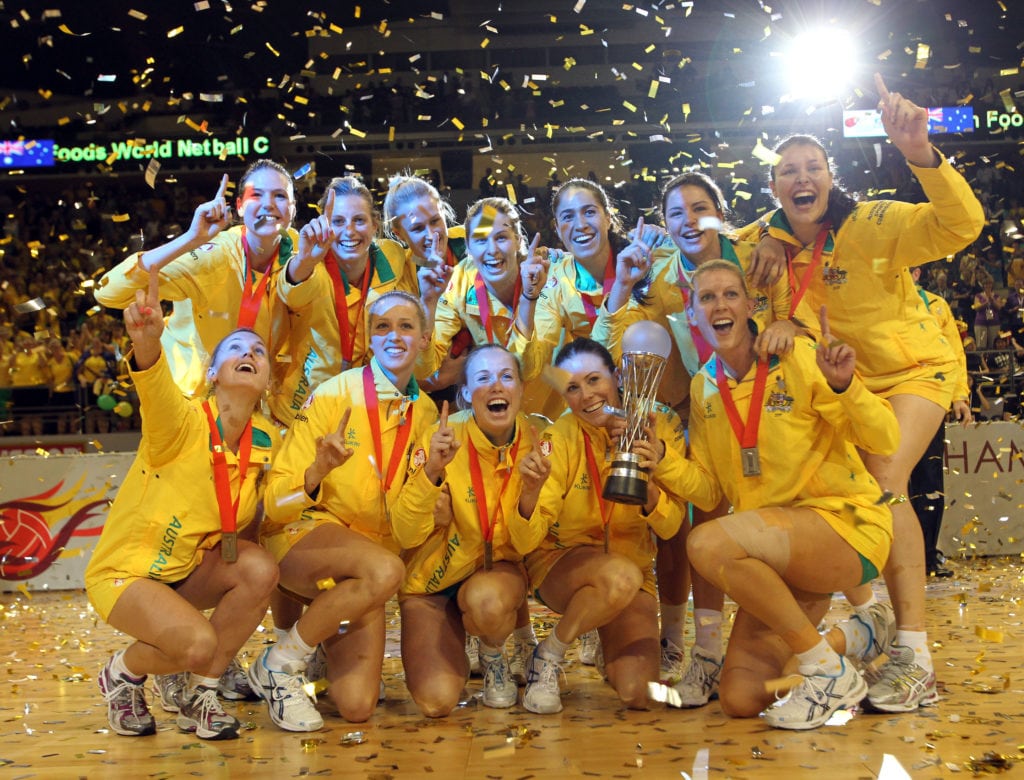
Nat von Bertouch and the Diamonds after their thrilling 2011 World Cup win in Singapore. Image: World Netball
Late in 2011, Wai Taumanu took over as Ferns coach and under her control, New Zealand claimed their first Constellation Cup in 2012. Australia was also undergoing change. Lisa Alexander took over as coach from Norma Plummer, and she had a challenging start to her time in the role, with a string of losses, including a 3-0 series defeat in England.
But within 12 months, she was able to turn things around completely. Late in 2013, Laura Geitz became Australian captain, and after a first game loss, she then led the Australian team on an incredible run of success. Between 2013 and 2015, Australia dominated netball, winning 21 tests in a row, nine of those against New Zealand. Included in that was the 2014 Commonwealth Games decider in Glasgow.
Reaching the gold medal final somewhat against the odds after a dramatic win over England, an injury-riddled New Zealand was eventually no match for the classy Australian team, which won 58-40. Captain Geitz led the way in defence and Caitlin Bassett dominated the scoring with 49 goals from 53 attempts. It was Australia’s first Commonwealth gold medal since 2002.
2014 COMMONWEALTH GAMES
1st – AUSTRALIA
BASSETT, Caitlin
CALDWELL, Tegan
CHATFIELD, Bianca
CORLETTO, Julie
GEITZ, Laura (captain)
GREEN, Kimberlee
HALLINAN, Renae
LAYTON, Sharni
MEDHURST, Natalie
RAVAILLION, Kimberley
ROBINSON, Madison
THWAITES, Caitlin
Coach: Lisa Alexander
2nd – NEW ZEALAND
BROWN, Jodi
DE BRUIN, Leana
FRANCOIS, Shannon
GRANT, Katrina
HALPENNY, Ellen
HARRISON, Anna
HENRY, Joline
KOPUA, Casey (captain)
LANGMAN, Laura
LATU, Cathrine
LEOTA, Liana
TUTAIA, Maria
Coach: Wai Taumaunu
In 2015, it was back to Sydney for the 14th Netball World Cup. The world record for a netball crowd was broken three times. 16,752 attended the final and that now stands as the record. When they clashed on the third day, it was the kiwis who came out on top, putting an end to Australia’s long winning run. This win no doubt gave them confidence, but it also allowed the Diamonds to look at improvements, should they meet again in the final.
And meet again they did. The final was almost decided in the first quarter. A dominant opening from Australian captain Laura Geitz at goal keeper and Julie Corletto in goal defence, shut the Silver Ferns shooters out of the game and the Diamonds led by nine at quarter time.
New Zealand narrowed the gap in each of the last three quarters, but the damage had been done. The Aussies held on in a tense final 15 minutes to win 58-55 and claim their 11th title. Caitlin Bassett shot 48/51, the most goals by anyone in a world cup final, and she was ably supported by the terrific work of Nat Medhurst at goal attack. Medhurst and Corletto both won their third straight world title, and later it was revealed that Corletto had in fact played the majority of the game with a fracture in her foot.
2015 WORLD CUP
1st – AUSTRALIA
BASSETT, Caitlin
BELL, Erin
BULLEY, Rebecca
CORLETTO, Julie
GEITZ, Laura (Captain)
GREEN, Kimberlee
HADLEY, Paige
HALLINAN, Renae
LAYTON, Sharni
MEDHURST, Natalie
RAVAILLION, Kim
THWAITES, Caitlin
Coach: Lisa Alexander
2nd – NEW ZEALAND
BROWN, Jodi
CULLEN, Kayla
DE BRUIN, Leana
FRANCOIS, Shannon
GRANT, Katrina
KARAKA, Phoenix
KOPUA, Casey (Captain)
LANGMAN, Laura
MES, Bailey
PASEKA, Malia
RASMUSSEN, Grace
TUTAIA, Maria
Coach: Wai Taumaunu
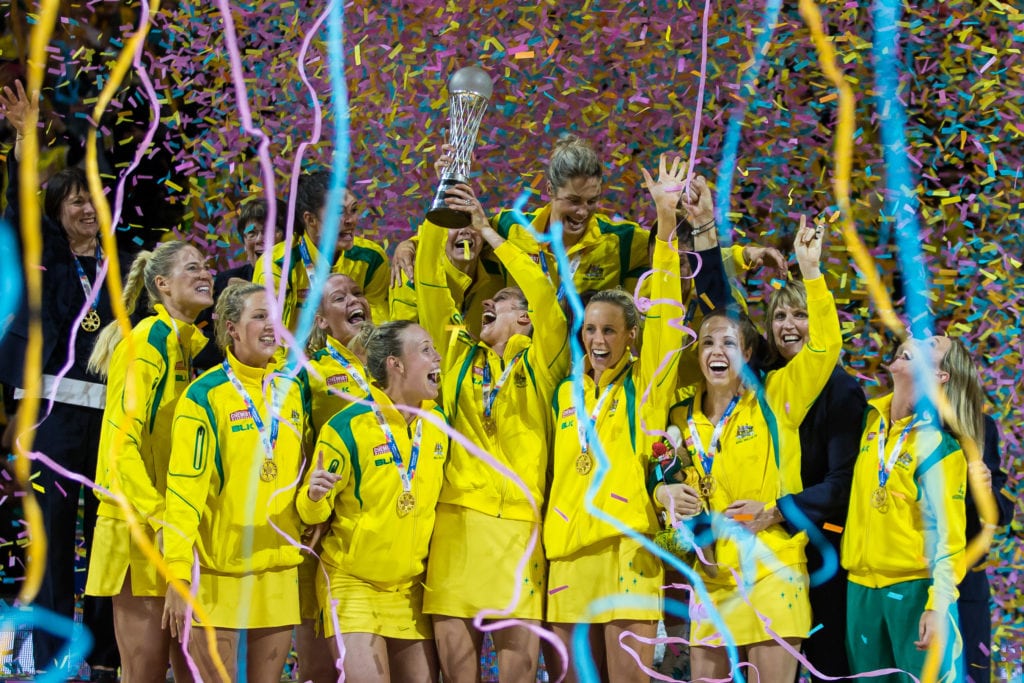
Laura Geitz lifts the trophy after the Diamonds’ 2015 World Cup win in Sydney. Image: World Netball
In November 2015, Netball New Zealand named Janine Southby as the replacement for Wai Taumaunu who was stepping down from the role of Silver Ferns coach. Noeline Taurua, considered a chance by many, was passed over for the job.
After 2016, the ANZ Championship was no more. Netball Australia and Netball New Zealand went their separate ways with the establishment of Suncorp Super Netball and the ANZ Premiership. At one stage, Netball New Zealand’s strict eligibility policy prevented Laura Langman from representing the Ferns while she was playing in Australia. This decision halted Langman’s incredible run of 141 straight test matches from her debut in 2005. In 2018, Langman decided to take a break from netball.
It’s fair to say that Southby had a difficult time as coach. It was during this time that the results got progressively worse for New Zealand, culminating in the team missing a medal at the 2018 Commonwealth Games on the Gold Coast. During the tournament, they were beaten by Australia by an astonishing 21 goals, their sixth straight loss to their trans-Tasman rivals.
With the kiwis off the pace, many people expected the Australians to take gold in 2018, but they were stunned in the final by a tremendous England team and went down in a thriller 52-51. While these Commonwealth Games ultimately proved a disappointment for both countries, this result sparked greater competitiveness in world netball, and it was now clear that it was no longer a formality that it would be Australia or New Zealand taking home the prize.
2018 COMMONWEALTH GAMES
2nd – AUSTRALIA
BASSETT, Caitlin (Captain)
BRANDLEY, April
BRUCE, Courtney
GEITZ, Laura
PETTITT, Susan
RAVAILLION, Kim
ROBINSON, Madi
SIMPSON, Gabi
THWAITES, Caitlin
WATSON, Liz
WESTON, Jo
WOOD, Steph
Coach: Lisa Alexander
4th – NEW ZEALAND
EKENASIO, Ameliaranne
FAKAHOKOTAU, Temalisi
FOLAU, Maria
FRANCOIS, Shannon
GRANT, Katrina (Captain)
JURY, Kelly
KARA, Grace
KERSTEN, Claire
MES, Bailey
SELBY-RICKIT, Te Paea
SOKOLICH-BEATSON, Michaela
SINCLAIR, Sam
Coach: Janine Southby
After a string of poor results, Janine Southby resigned as New Zealand coach after the Games, and not surprisingly, Noeline Taurua was named as her replacement. Returning to the game, Laura Langman was granted an exemption (along with Maria Folau) to allow her to play in Australia in 2019 and still represent New Zealand. Langman took over the captaincy of the Silver Ferns while champion defender Casey Kopua was also enticed back into the fold by Taurua, and the fightback began.
In 2019, the 15th Netball World Cup was held in Liverpool. Both semi finals were two-goal thrillers with Australia just getting up over South Africa, and New Zealand edging out England. So we had another trans-Tasman final, just as it had been at every world cup since 1995 in Birmingham. And this final was another tremendous contest.
Earlier in the tournament, Australia had beaten New Zealand by a solitary goal in the group stages, but the kiwis would have gained great confidence from that match, having fought back from a deficit of eight goals. In the final, it was New Zealand which got on top in a high scoring second quarter and they led by four going into the last 15 minutes.
It was Ameliaranne Ekenasio who was the star for the Silver Ferns. Under enormous pressure, she held her nerve throughout and landed some amazing goals to continually keep the Australians at bay. The Diamonds came home hard in the last quarter, but the kiwis held on in an exciting finish. The Silver Ferns’ greater experience counted for plenty as they protected their one goal lead and played out time to record a deserved 52-51 victory.
Playing a big part in the win were the three New Zealand netball greats Kopua, Folau and Langman. This was their World Cup swan song. With the help of those three “fossils”, Noeline Taurua had achieved what was almost unthinkable. In the job less than 12 months, she had successfully turned the team right around from their disastrous showing at the 2018 Commonwealth Games.
2019 WORLD CUP
1st – NEW ZEALAND
BURGER, Karin
CRAMPTON, Gina
EKENASIO, Ameliaranne
FOLAU, Maria
KARAKA, Phoenix
KOPUA, Casey
LANGMAN, Laura (Captain)
MES, Bailey
RORE, Katrina
SAUNDERS, Shannon
SELBY-RICKIT, Te Paea
WATSON, Jane
Coach: Noeline Taurua
2nd – AUSTRALIA
BASSETT, Caitlin (Captain)
BRANDLEY, April
BROWNE, Kelsey
BRUCE, Courtney
HADLEY, Paige
KLAU, Sarah
PRICE, Jamie-Lee
THWAITES, Caitlin
TIPPETT, Gretel
WATSON, Liz
WESTON, Jo
WOOD, Stephanie
Coach: Lisa Alexander

The Silver Ferns celebrate after their win in the 2019 World Cup final. Image: May Bailey
The 2020s
So near, but yet so far. Two one-goal defeats in a row in major tournaments ultimately spelled the end for Australian coach Lisa Alexander, and she was replaced by Stacey Marinkovich in 2020. The Covid pandemic affected international netball at this time however and the Diamonds didn’t play a test in 2020. In fact, they didn’t play a test at home until 2022.
In 2021, the entire four test Constellation Cup series was held in Christchurch and it was a rocky start for Marinkovich with New Zealand, led by Ameliaranne Ekenasio, winning 3-1. It was at this stage that midcourter Liz Watson took over as Diamonds captain from Caitlin Bassett, who ended her career with 102 test caps.
In 2022, the Commonwealth Games were held in Birmingham and under the leadership of Watson and Marinkovich, the Australians were back in the gold medal position. In a strong competition, Australia came back from a defeat to Jamaica in the group games, to beat them in the final. The star for Australia was shooter Gretel Bueta who proved to be the point of difference.
The New Zealanders lost to Jamaica in the semi-finals, but bounced back to defeat England in the bronze medal game. For the first time ever at a Commonwealth Games, Australia and New Zealand didn’t meet during the whole tournament.
2022 COMMONWEALTH GAMES
1st – AUSTRALIA
ARYANG, Sunday
AUSTIN, Kiera
BRAZIll, Ash
BRUCE, Courtney
BUETA, Gretel
HADLEY, Paige
KLAU, Sarah
KOENEN, Cara
MOLONEY, Kate
WATSON, Liz (Captain)
WESTON, Jo
WOOD, Steph
Coach: Stacey Marinkovich
3rd – NEW ZEALAND
CRAMPTON, Gina (Captain)
FITZPATRICK, Sulu
HEFFERNAN, Kate
JOHNSON, Kayla
JURY, Kelly
KARAKA, Phoenix
MES, Bailey
NWEKE, Grace
SAUNDERS, Shannon
SELBY-RICKIT, Te Paea
SOUNESS, Whitney
WILSON, Maia
Coach: Noeline Taurua
On to Cape Town in 2023 for the 16th Netball World Cup, and it was a very different result for the two nations. For Australia, defender Courtney Bruce starred as the Diamonds triumphed over Jamaica in the semi finals, and then England in the final, having lost to the Roses earlier in the group stage.
But it was a nightmare tournament for the Silver Ferns. They failed to overcome an early injury to star goal shooter Grace Nweke and could finish no better than fourth, their worst ever finish at a world cup. Incredibly, once again Australia and New Zealand didn’t meet once throughout the entire tournament.
2023 WORLD CUP
1st – AUSTRALIA
ARYANG, Sunday
AUSTIN, Kiera
BRAZIll, Ash
BRUCE, Courtney
GARBIN, Sophie
HADLEY, Paige
KLAU, Sarah
KOENEN, Cara
PRICE, Jamie-Lee
WATSON, Liz (Captain)
WESTON, Jo
WOOD, Steph
Coach: Stacey Marinkovich
4th – NEW ZEALAND
BURGER, Karin
CRAMPTON, Gina
EKENASIO, Ameliaranne (Captain)
GORDON, Maddy
HEFFERNAN, Kate
JURY, Kelly
KARAKA, Phoenix
METUARAU, Tiana
NWEKE, Grace
SELBY-RICKIT, Te Paea
SOUNESS, Whitney
WATSON, Jane
WILSON, Maia
Coach: Noeline Taurua
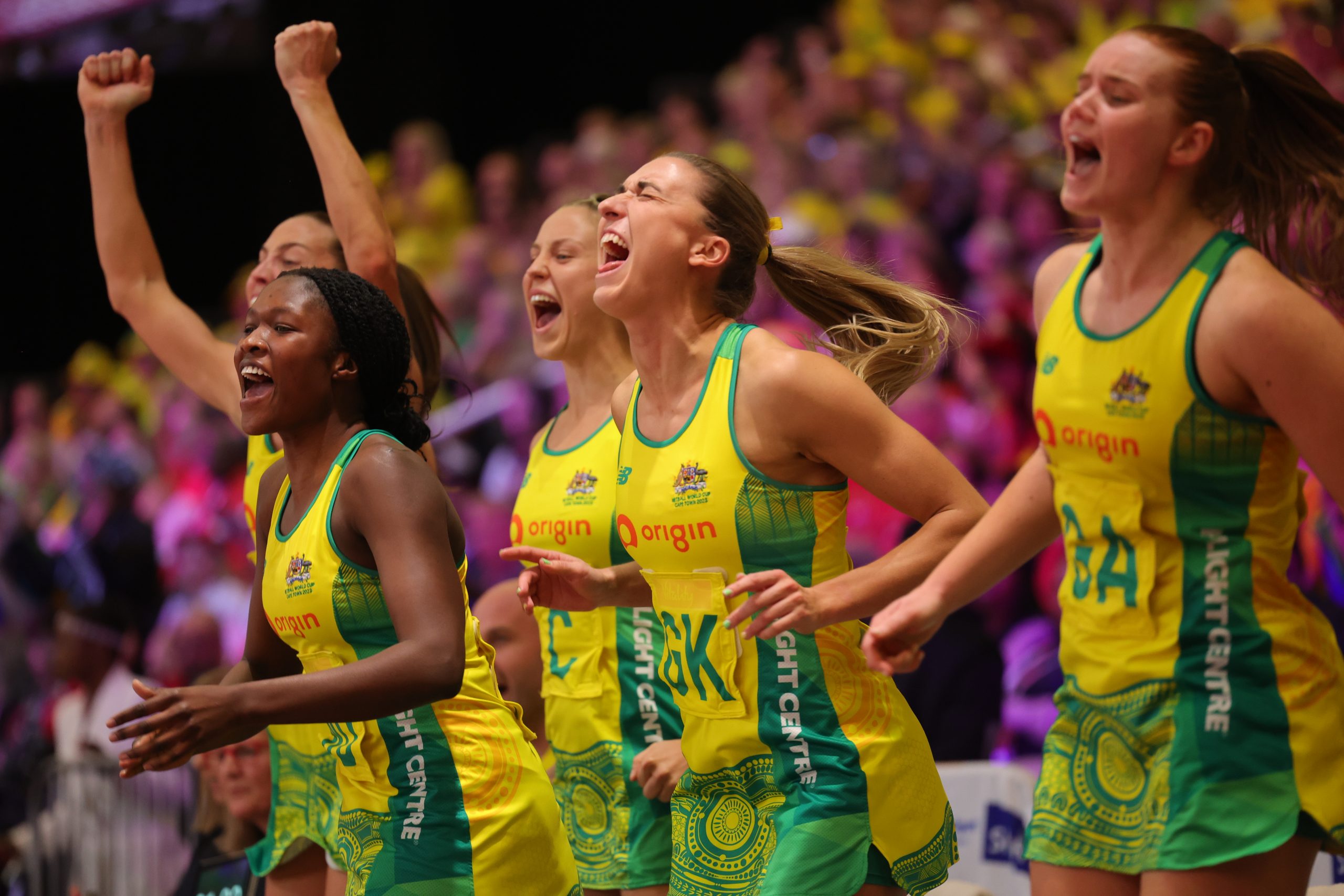
The Australian bench start to celebrate their 2023 World Cup win. Image: Danny Dalton
Australia is currently ranked number one, and they’re the World Cup and Commonwealth Games champions. But they’ve received a big wake-up call in the just completed Constellation Cup. The Silver Ferns dominated the Diamonds in the first three tests to claim just their third ever win in the series. New Zealand has a good recent record in the Constellation Cup and this series win will give them great confidence for the future.
The long-standing rivalry between the two most successful nations is one of netball’s great traditions. They have combined to produce some of the very best moments in sport. Whenever they clash, it is always something special.
Just consider this. In the long history of the Netball World Cup, Australia and New Zealand have met 17 times, and after more than 1000 minutes of playing time, there is just one goal separating the two nations. Australia has scored 757 goals and New Zealand 756. And in eight of those 17 meetings (including the first and the most recent), the margin has been no greater than one goal. That’s really quite remarkable.
Check out the head-to-head records and the results of every Australia v New Zealand test match ever played…
Head To Head
All Matches:
Played 171
Won by Aus 106
Won by NZ 63
Drawn 2
World Cup/Comm Games*:
Played 23
Won by Aus 15
Won by NZ 7
Drawn 1
*not including 1990 CG demonstration match.
Matches in Aus:
Played 73
Won by Aus 48
Won by NZ 24
Drawn 1
Matches in NZ:
Played 72
Won by Aus 39
Won by NZ 32
Drawn 1
Neutral venues:
Played 26
Won by Aus 19
Won by NZ 7
Drawn 0
Constellation Cup:
Played 56
Won by Aus 34
Won by NZ 22
All Test Results
1938 – One-off test in Aus
Aug 20 – AUS 40 def NZ 11 (Melbourne)
1948 – Aus tour of NZ
Aug 14 – AUS 26 def NZ 17 (Dunedin)
Aug 28 – AUS 44 def NZ 13 (New Plymouth)
Sep 11 – AUS 44 def NZ 22 (Auckland)
1960 – NZ tour of Aus
Aug 20 – NZ 49 def AUS 40 (Adelaide)
Aug 27 – AUS 44 def NZ 39 (Melbourne)
Sep 03 – AUS 46 def NZ 45 (Sydney)
1963 – 1st World Tournament (Eastbourne)
Aug 08 – AUS 37 def NZ 36
1967 – 2nd World Tournament (Perth)
Aug 23 – NZ 40 def AUS 34
1969 – One-off test in NZ
Jun 20 – AUS 49 def NZ 39 (Wellington)
1971 – 3rd World Tournament (Kingston)
Jan 12 – AUS 48 def NZ 42
1975 – 4th World Tournament (Auckland)
Sep 04 – NZ 34 drew with AUS 34
1979 – 5th World Tournament (Port-of-Spain)
Aug 22 – AUS 38 def NZ 36
1981 – Tri-series in Aus
Jun 17 – NZ 37 def AUS 32 (Brisbane)
Jun 20 – NZ 48 def AUS 29 (Sydney)
Jun 23 – NZ 37 def AUS 34 (Melbourne)
1982 – Aus tour to NZ
Jul 10 – NZ 54 def AUS 41 (Auckland)
Jul 14 – NZ 53 def AUS 52 (Palmerston North)
Jul 17 – AUS 33 def NZ 28 (Christchurch)
1983 – 6th World Tournament (Singapore)
Jun 24 – AUS 47 def NZ 42
1985 – Australia Games (Melbourne, Australia)
Feb 01 – AUS 27 drew with NZ 27
Feb 03 – NZ 31 def AUS 27 (Final)
1985 – World Games (London, England)
Aug 04 – NZ 39 def AUS 37
1986 – Tri-series in NZ
May 03 – AUS 37 def NZ 27 (Christchurch)
May 06 – AUS 33 def NZ 27 (Palmerston North)
May 10 – AUS 30 def NZ 27 (Hamilton)
1986 – Tri-series in Aus
May 14 – AUS 35 def NZ 19 (Sydney)
May 17 – AUS 31 def NZ 19 (Launceston)
May 20 – NZ 31 def AUS 28 (Adelaide)
1987 – 7th World Tournament (Glasgow)
Aug 26 – NZ 39 def AUS 28
1989 – Test series in NZ
Apr 26 – NZ 47 def AUS 46 (Auckland)
Apr 29 – NZ 51 def AUS 47 (Palmerston North)
May 03 – NZ 49 def AUS 37 (Dunedin)
1989 – World Games (Karlsruhe, Germany)
Jul 24 – NZ 33 def AUS 29
1990 – Commonwealth Games (Auckland)
Feb 02 – AUS 53 def NZ 35 (Demonstration sport)
1990 – Tri-series in Aus
Jun 09 – AUS 44 def NZ 42 (Perth)
Jun 16 – NZ 57 def AUS 51 (Melbourne)
Jun 19 – AUS 52 def NZ 40 (Sydney) (Final)
1991 – 8th World Championships (Sydney)
Jul 13 – AUS 53 def NZ 52 (Final)
1992 – Test series in Aus
Jul 13 – AUS 67 def NZ 46 (Melbourne)
Jul 17 – AUS 55 def NZ 45 (Sydney)
Jul 20 – AUS 64 def NZ 37 (Adelaide)
1993 – World Games (The Hague, Netherlands)
Jul 31 – AUS 62 def NZ 36
1994 – Test series in NZ
May 17 – AUS 52 def NZ 49 (Dunedin)
May 21 – AUS 47 def NZ 44 (Palmerston North)
May 25 – NZ 53 def AUS 49 (Auckland)
1995 – 9th World Championships (Birmingham)
Jul 20 – AUS 45 def NZ 44
1996 – Test series in Aus
Jun 22 – AUS 49 def NZ 40 (Sydney)
Jun 26 – AUS 58 def NZ 39 (Adelaide)
Jun 29 – AUS 56 def NZ 35 (Melbourne)
1996 – One-off test in Aus
Nov 16 – AUS 52 def NZ 41 (Newcastle)
1997 – One-off test in NZ
Jul 30 – AUS 49 def NZ 43 (Hamilton)
1998 – Test series in NZ
May 20 – AUS 58 def NZ 47 (Hamilton)
May 23 – AUS 58 def NZ 49 (Wellington)
May 26 – AUS 52 def NZ 48 (Dunedin)
1998 – Commonwealth Games (Kuala Lumpur)
Sep 21 – AUS 42 def NZ 39 (Final)
1999 – One-off test in NZ
Feb 27 – NZ 60 def AUS 48 (Christchurch)
1999 – 10th World Championships (Christchurch)
Oct 02 – AUS 42 def NZ 41 (Final)
2000 – One-off test in Aus
Jun 20 – AUS 53 def NZ 30 (Newcastle)
2000 – Tri-series in SA
Nov 28 – NZ 52 def AUS 40 (Pietermaritzburg)
2001 – Tri-series in Aus
Jun 09 – NZ 55 def AUS 40 (Melbourne)
Jun 16 – AUS 62 def NZ 52 (Sydney)
2001 – Test series in NZ
Oct 20 – AUS 51 def NZ 47 (Wellington)
Oct 24 – NZ 58 def AUS 47 (Invercargill)
Oct 27 – AUS 50 def NZ 46 (Christchurch)
2002 – Commonwealth Games (Manchester)
Aug 4 – AUS 57 def NZ 55 (Final)
2003 – 11th World Championships (Kingston)
Jul 20 – NZ 49 def AUS 47 (Final)
2004 – Test series in NZ
Jun 30 – NZ 54 def AUS 45 (Christchurch)
Jul 02 – NZ 52 def AUS 50 (Palmerston North)
Jul 05 – NZ 53 def AUS 46 (Hamilton)
2004 – Test series in Aus
Nov 13 – AUS 54 def NZ 49 (Sydney)
Nov 16 – NZ 50 def AUS 42 (Perth)
Nov 20 – AUS 53 def NZ 51 (Melbourne)
2005 – One-off test in Aus
Jun 29 – NZ 50 def AUS 43 (Sydney)
2005 – One-off test in NZ
Oct 29 – NZ 61 def AUS 36 (Auckland)
2006 – Commonwealth Games (Melbourne)
Mar 26 – NZ 60 def AUS 55 (Final)
2006 – Test series in Aus
Jul 22 – NZ 52 def AUS 40 (Brisbane)
Jul 25 – AUS 48 def NZ 38 (Sydney)
2006 – Test series in NZ
Oct 12 – AUS 51 def NZ 47 (Wellington)
Oct 14 – NZ 43 def AUS 37 (Auckland)
Oct 16 – AUS 46 def NZ 40 (Christchurch)
2007 – Tri-series in Eng
May 15 – AUS 50 def NZ 47 (Birmingham)
2007 – One-off test in NZ
Jul 18 – AUS 53 def NZ 46 (Auckland)
2007 – Test series in Aus
Jul 21 – NZ 67 def AUS 65 (Melbourne)
Jul 24 – AUS 54 def NZ 47 (Adelaide)
2007 – 12th World Championships (Auckland)
Nov 17 – AUS 42 def NZ 38 (Final)
2008 – Test series in NZ
Sep 17 – AUS 53 def NZ 51 (Christchurch)
Sep 20 – NZ 37 def AUS 31 (Auckland)
2008 – Test series in Aus
Oct 26 – NZ 46 def AUS 41 (Melbourne)
Nov 02 – AUS 43 def NZ 41 (Brisbane)
2009 – Test series in Aus
Sep 06 – NZ 53 def AUS 50 (Sydney)
Sep 09 – AUS 48 def NZ 44 (Melbourne)
Sep 13 – AUS 36 def NZ 33 (Brisbane)
2009 – Test series in NZ
Sep 20 – AUS 47 def NZ 46 (Christchurch)
Sep 23 – NZ 52 def AUS 36 (Auckland)
2010 – Constellation Cup
Aug 29 – AUS 48 def NZ 43 (Adelaide)
Sep 02 – NZ 59 def AUS 40 (Wellington)
Sep 05 – AUS 46 def NZ 40 (Auckland)
2010 – Commonwealth Games (Delhi)
Oct 14 – NZ 66 def AUS 64 (Final)
2011 – Constellation Cup (Part 1 in NZ)
Jun 09 – AUS 52 def NZ 47 (Palmerston North)
Jun 12 – NZ 45 def AUS 42 (Auckland)
2011 – 13th World Championships (Singapore)
Jul 10 – AUS 58 def NZ 57 (Final)
2011 – Constellation Cup (Part 2 in Aus)
Oct 23 – NZ 49 def AUS 48 (Perth)
Oct 26 – AUS 51 def NZ 44 (Adelaide)
Oct 30 – AUS 44 def NZ 41 (Melbourne)
2012 – Constellation Cup
Sep 16 – NZ 54 def AUS 52 (Melbourne)
Sep 20 – NZ 50 def AUS 49 (Auckland)
Sep 23 – AUS 59 def NZ 53 (Christchurch)
2012 – Quad Series in Aus/NZ
Oct 21 – AUS 68 def NZ 48 (Sydney)
Nov 01 – NZ 48 def AUS 43 (Hamilton)
2013 – Constellation Cup
Sep 15 – NZ 55 def AUS 51 (Invercargill)
Sep 19 – AUS 48 def NZ 45 (Auckland)
Oct 04 – AUS 58 def NZ 50 (Adelaide)
Oct 07 – AUS 52 def NZ 47 (Melbourne)
Oct 13 – AUS 50 def NZ 49 (Canberra)
2014 – Commonwealth Games (Glasgow)
Aug 03 – AUS 58 def NZ 40 (Final)
2014 – Constellation Cup
Oct 02 – AUS 59 def NZ 42 (Invercargill)
Oct 08 – AUS 49 def NZ 40 (Melbourne)
Oct 11 – AUS 47 def NZ 34 (Sydney)
Oct 15 – AUS 51 def NZ 47 (Auckland)
2015 – 14th Netball World Cup (Sydney)
Aug 09 – NZ 52 def AUS 47
Aug 16 – AUS 58 def NZ 55 (Final)
2015 – Constellation Cup
Oct 02 – AUS 50 def NZ 44 (Christchurch)
Oct 08 – AUS 58 def NZ 48 (Auckland)
Oct 11 – NZ 50 def AUS 47 (Melbourne)
Oct 15 – NZ 58 def AUS 47 (Perth)
2016 – Quad Series in Aus/NZ
Sep 04 – AUS 60 def NZ 55 (Melbourne)
2016 – Constellation Cup
Oct 09 – AUS 68 def NZ 56 (Sydney)
Oct 12 – NZ 53 def AUS 51 (Launceston)
Oct 15 – AUS 62 def NZ 50 (Auckland)
Oct 20 – AUS 49 def NZ 45 (Invercargill)
2017 – Quad Series in Eng/SA
Jan 28 – AUS 57 def NZ 50 (Durban)
2017 – Quad Series in Aus/NZ
Sep 03 – NZ 57 def AUS 47 (Invercargill)
2017 – Constellation Cup
Oct 05 – AUS 57 def NZ 54 (Auckland)
Oct 08 – AUS 60 def NZ 52 (Christchurch)
Oct 11 – AUS 55 def NZ 43 (Adelaide)
Oct 15 – AUS 58 def NZ 42 (Sydney)
2018 – Quad Series in SA/Eng
Jan 28 – AUS 67 def NZ 48 (Johannesburg)
2018 – Commonwealth Games (Gold Coast)
Apr 14 – AUS 65 def NZ 44
2018 – Quad Series in Aus/NZ
Sep 23 – AUS 60 def NZ 55 (Melbourne)
2018 – Constellation Cup
Oct 07 – AUS 57 def NZ 42 (Brisbane)
Oct 10 – AUS 56 def NZ 47 (Townsville)
Oct 14 – NZ 55 def AUS 44 (Hamilton)
Oct 18 – AUS 58 def NZ 47 (Wellington)
2019 – Quad Series in Eng
Jan 19 – AUS 53 def NZ 50 (London)
2019 – 15th Netball World Cup (Liverpool)
Jul 18 – AUS 50 def NZ 49
Jul 22 – NZ 52 def AUS 51 (Final)
2019 – Constellation Cup
Oct 13 – NZ 53 def AUS 52 (Christchurch)
Oct 16 – AUS 48 def NZ 42 (Auckland)
Oct 20 – NZ 54 def AUS 53 (Sydney)
Oct 27 – AUS 53 def NZ 46 (Perth)
2021 – Constellation Cup
Mar 02 – NZ 49 def AUS 44 (Christchurch)
Mar 03 – AUS 45 def NZ 36 (Christchurch)
Mar 06 – NZ 55 def AUS 49 (Christchurch)
Mar 07 – NZ 45 def AUS 43 (Christchurch)
2022 – Quad Series in Eng
Jan 15 – AUS 53 def NZ 39 (London)
2022 – Constellation Cup
Oct 12 – NZ 56 def AUS 48 (Auckland)
Oct 16 – NZ 52 def AUS 48 (Tauranga)
Oct 19 – AUS 62 def NZ 47 (Melbourne)
Oct 23 – AUS 57 def NZ 53 (Gold Coast)
2023 – Quad Series in SA
Jan 22 – AUS 59 def NZ 57 (Cape Town)
Jan 25 – AUS 56 def NZ 50 (Cape Town)
2023 – Constellation Cup
Oct 12 – AUS 50 def NZ 40 (Melbourne)
Oct 15 – AUS 55 def NZ 46 (Brisbane)
Oct 19 – NZ 56 def AUS 53 (Invercargill)
Oct 23 – NZ 53 def AUS 50 (Auckland)
2024 – Netball Nations Cup
Jan 20 – AUS 63 def NZ 50 (London)
2024 – Constellation Cup
Oct 20 – NZ 64 def AUS 50 (Wellington)
Oct 23 – NZ 63 def AUS 52 (Auckland)
Oct 27 – NZ 61 def AUS 43 (Perth)
Oct 30 – AUS 63 def NZ 50 (Melbourne)
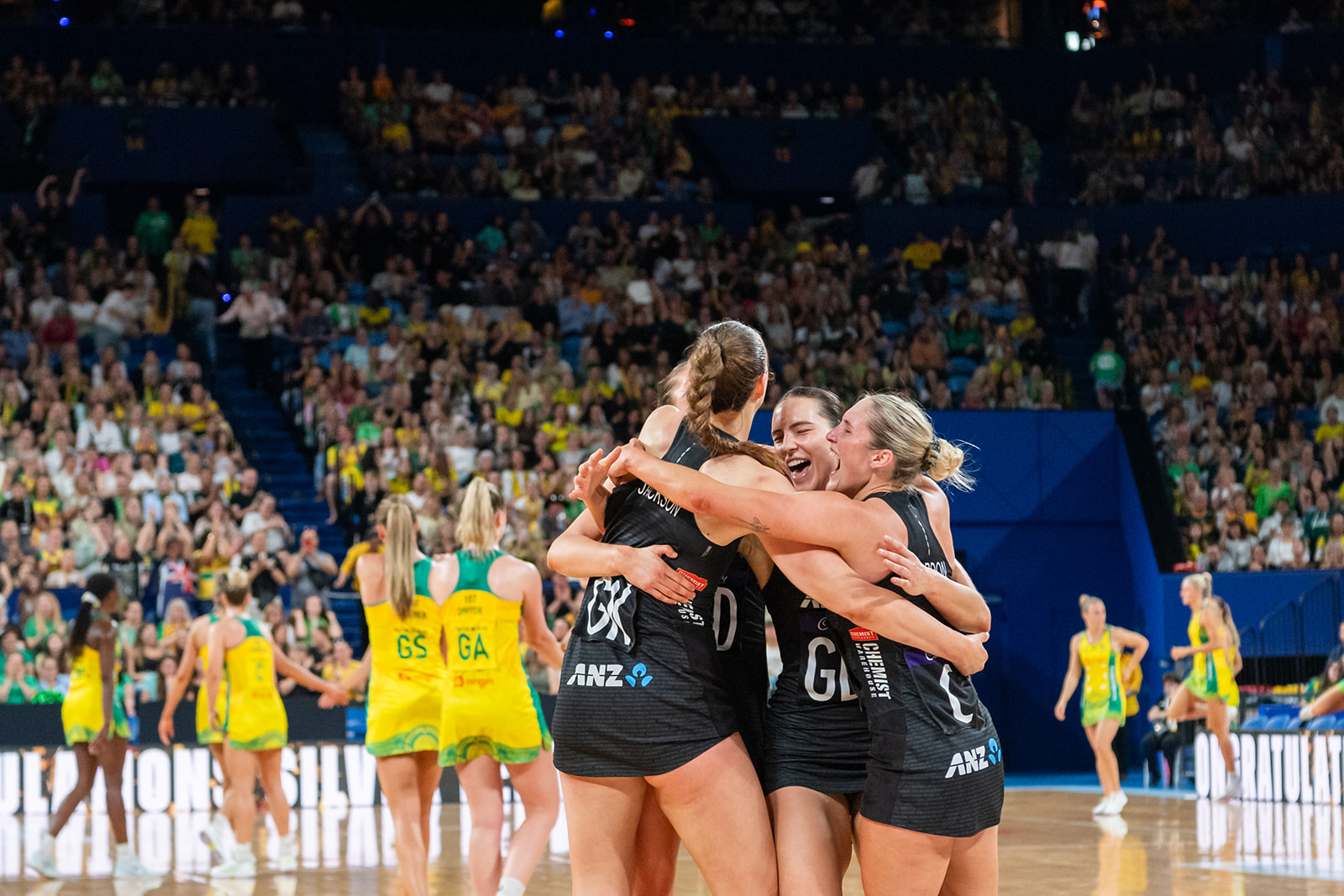
The Silver Ferns wrap up the 2024 Constellation Cup in Perth. Image: Clinton Bradbury/Bradbury Photography



